#this is Entirely off topic but the whole thing reminds me of that scene from skyfall
Text
I was looking through the Fionna and Cake trailer to look for scenes we haven't seen in the show yet, and I noticed how most of them are most likely from the same episode. So, on this post, I will be talking about my theories/speculations for Episode 7, The Star.[Spoilers for the episode synopsis under the cut]
So this is what we know about the episode right now.
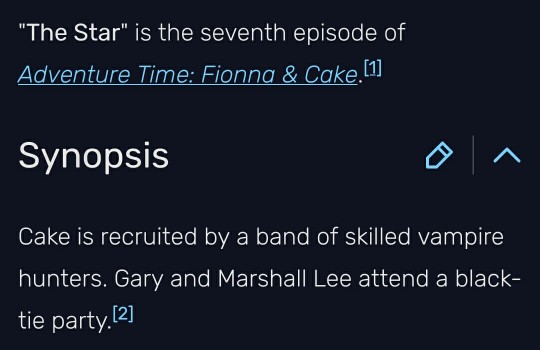
My first theory was that the title came from whatever happens in the gumlee subplot or maybe it was about Cake being "the star" of the vampire hunters, but then my friend Will reminded me how the previous episodes were all names of characters (Yes, Im counting Destiny idc), and said it could be a nickname for a pre existing character. Maybe it could be this world's Marcy's "Vampire Name". I dont know enough on the topic to be able to tell if it would fit in with the theme the vampires in Stakes had, but it does have an article at its start.
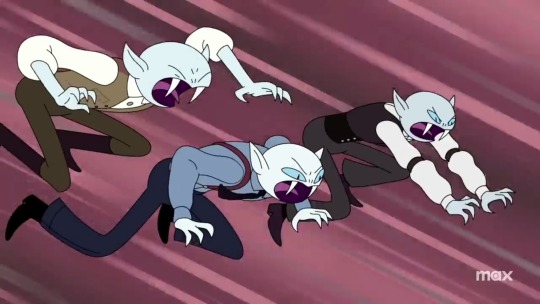
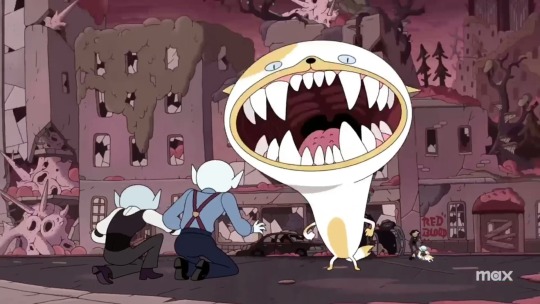
For the first screenshots we have these. The first image shows up near the end of the trailer, its 3 vampires attacking. I think these two are back to back, as the vamps are exactly the same. In the second image the third vampire is in the background and appears to have knocked Fionna down, with Simon standing next to the vampire. Maybe Cake does that attack in rage due to them hurting Fionna.
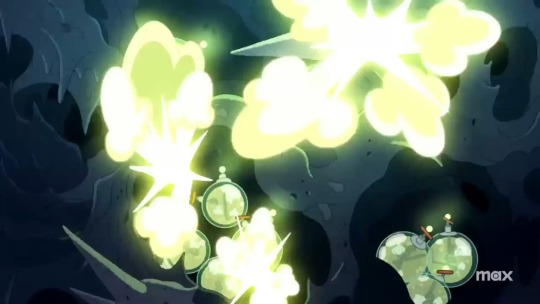
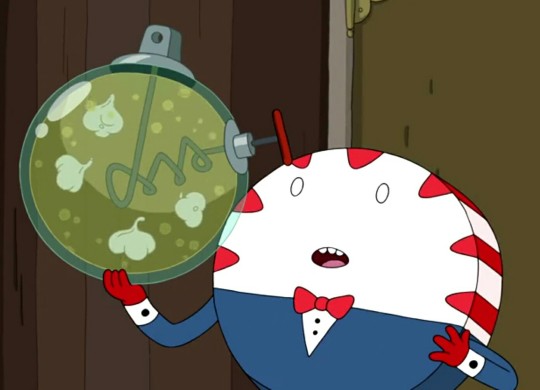
This is a one second scene and the frame where the explosions dont cover up the whole screen is very hard to catch, but these are the same garlic bombs Peppermint Butler had in Stakes. Maybe the Bubblegum of this universe, along with Pep But, is working with the vampire hunters.
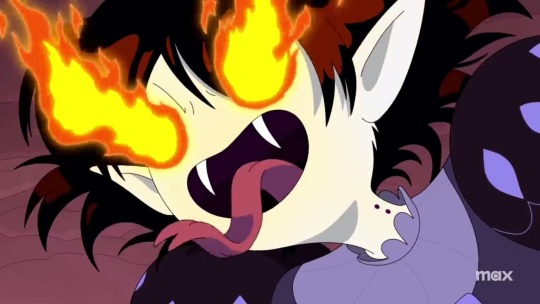
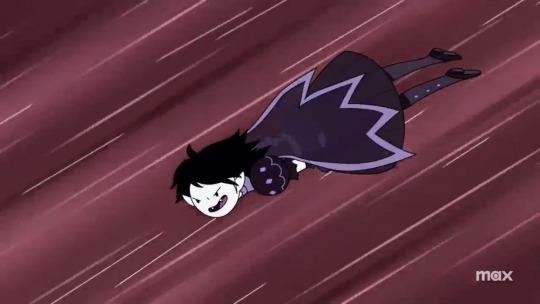
Following up on what I said about Marcy having a "Vampire Name". When I first read the synopsis I assumed that Marcy was the one leading the vamp hunters, as it only makes sense. Being a Vampire hunter was a big part of her backstory that led to her *becoming* one. But I then realized, what's going on here, might be completely different. Not only is she already a vampire, both in the trailer and on the poster this Marceline looks pretty smug for someone presumably fighting for her life, and she has that dress which looks very "royal"(to me, at least).
I thought maybe she embraced being the vampire queen, and attacked the humans, but that wouldn't make sense. Why would she hurt the beings she wiped out an entire species for? And then it clicked: this Marcy never had a Simon at all. She was found by vampires instead of him. Remember the conversation Simon and little Marcy had at the beginning of episode 2?

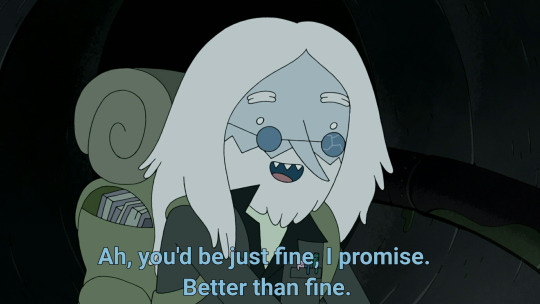


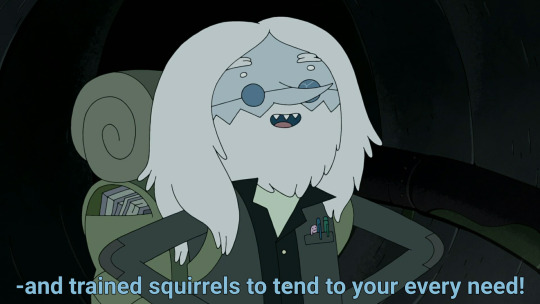
Someone rich? Living in a castle? With people trained to tend to their every need? Sounds a hell lot like a king.
This conversation is going to come up again. Simon is going to find out that No, Marcy would NOT have been fine if he didn't find her. He's going to see what would really have happened to her if she never met him. In all the past episodes Simon's been constantly told that he sucks, that Ice King was "better" and "more fun". He's been feeling like he truly did not matter and had no value, that it would be better for everyone if he just went back to being Ice King. He's going to see that that's not true, that he does matter. That Marcy values and needs him, even if things are different now. Maybe he won't get it immediately, but he might start doubting his decision to wear the crown again. I'm so confident in this I will eat my door if it doesn't happen.
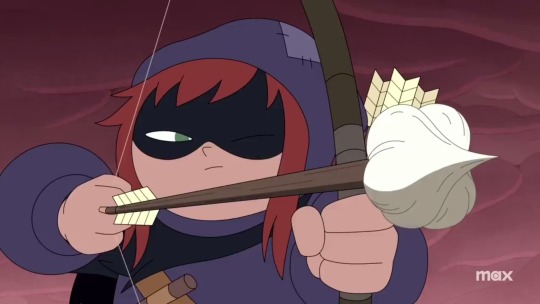
Human huntress wizard with a garlic arrow. Obviously its from this episode. She must be a hunter(duh) and maybe she's the leader as well. Or maybe Im right about Bonnie being there and *she's* the leader.

Im only assuming this scene is from this episode bc the background color scheme is similar, I dont have any other evidence for it. It may be after Cake beats the vampires, where she gets approached by the hunters to join in. Im kinda basing this theory off the voice line that goes along with it in the trailer ("Now that is a party I don't wanna miss" Who'd wanna miss out on the fun of hunting evil vampires?), but the voice line may be about something else and she could be praising herself to the hunters here (she just has that vibe in here).

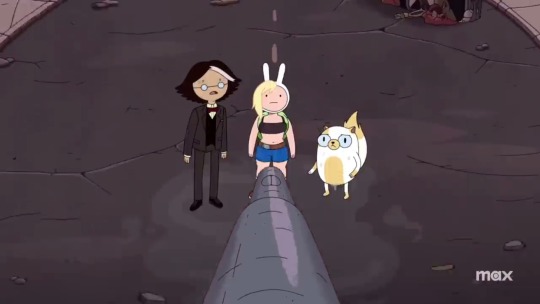
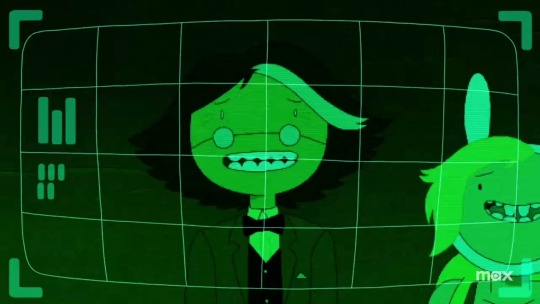
A gun(?) Lowers down to face the gang. They smile at it nervously. The ground theyre standing on is wet, and so is Cake. I don't know the reason for that, because they didn't immediately come here after leaving the Winter Kingdom. They might have gotten their clothes wet on some other universe and then came to this world, or maybe this is after they fight the vampires and they somehow got splashed with water during the process. I came up with two possibilities of what might be going on here:
Option A) It is the vampires spotting and trying to kill them. If thats the case they might've destroyed the gun before it could shoot them, or maybe Fionna got shot and thats why she's down on the scene where Cake is attacking. Both end up with the 3 vampire goons attacking.
Option B) It's the vampire hunters seeing them, either after the fight or right as they arrive, and they think the gang are vampires as well until they show their teeth

This isn't from the trailer its from a magazine. I think its from this episode because of the background, like that Cake screenshot. This may be after Cake is recruited. Fionna seems to be annoyed so maybe Cake is doing something wrong and Fionna's disagreeing with her. Or maybe Cake's trying to annoy Fionna and it's working. My friend @weirdlizard26 said this about it, which is far better than what I came up with:

And that's it for the speculation! I wanted to talk about the rest of the scenes in the trailer as well but 1) this post is long enough as it is and 2) tumblr image limit is not being kind to me rn. I might make a separate post for those if I get the motivation. Untill then you'll have just one post of me going insane rambling about what could happen in a show about an old man having an existential crisis and a girlfailure with her cat.
#tagging time#at#adventure time#fionna and cake#simon petrikov#fionna campbell#cake the cat#marceline the vampire queen#marceline abadeer#huntress wizard#ace's cherry#fionna the human#<- I forgot she had 2 tags
121 notes
·
View notes
Note
Random but - if you were given an opportunity to rewrite Ford's character and his arc in the show (and later J3), how would it be like?
canon gay and trans
so the thing is that i think most of how ford himself is written is really really good! i just think that the writers (particularly alex) have a bias against him, and so a lot of the narrative ends up feeling like he's either being punished or being forced to atone for his past. so i'm gonna ramble and daydream for a bit but i want to be clear i actually really like how he's written in general (yes, even in the book that i have so much beef with!!)
there's very few moments of catharsis for him, and those that he gets are either short (reunion with fiddleford) or undermined by the writers' bias (the ending of journal 3 where he burns all his bill stuff but has to keep reminding us that he was stupid for trusting bill in the first place). so i think a lot of the problems i have would be resolved with tonal shifts and a few cuts, like that fucking scene in the stanchurian candidate with the mind control tie. the implication of reaganite ford is bad enough but then to have a guy who has very specific trauma relating to being mind controlled/not being in control of his own body just hand that over is really fucking stupid. then again i think that whole episode is stupid so i'd end up rewriting all of it lmao
i've said before but if i really had my way i'd cut roadside attraction entirely and replace it with another ford episode. i loved how goofy and fun dd&md was and i think if more of that lighthearted side of him was shown it would endear him to the audience more. a long time ago i had an idea for an episode where they go back to the bunker and ford basically does puppy talk to the shapeshifter who is actively trying to kill them. i never followed this idea through to its conclusion but i think it still sounds entertaining, plus it would also give more time for him to reunite with fiddleford so it wouldn't have to be squeezed in the finale.
speaking of the finale... my personal fantasy is that i'd love to have a scene stuck in there where stan apologizes to ford. it REALLY stood out to me that despite all their fighting, ford still at least says the words "i'm sorry" to stan. stan never apologizes for anything he did to ford - neither for breaking his project, nor for banishing him to the hell dimension for 30 years. i get that they were mistakes, but you still have to apologize for mistakes (and if i allow myself to get very self-indulgent for a second, i've often thought the whole story would be a lot more resonant if stan broke ford's machine on purpose). i had a whole section in here where i talked about what a scene like this would look like but it was so long... if people want to hear more about it i'll say more but it's the kind of thing that warrants its own post.
anyway. moving on from the show itself. so possibly my hottest take is that i think journal 3 should not have been published KJSHDFLGKHSDFGUIWEHRGJSDF. basically i think instead of trying to write the actual journal 3 they should have picked a handful of stories from his research era that they wanted to tell and made a graphic novel about that. i got WAAAAAAAYYYY off topic and wrote PARAGRAPHS about this but it's not related to the question you asked so i'll just summarize by saying i think it would play more to their strengths as writers, leave more to the imagination, and they could leave out all those fucking retcons that i hate
as it is, though, again, i think that ford is written pretty well in the journal. there are a few off-handed comments and lines that give me "he would not fucking say that" vibes but overall it very realistically portrays what it's like for someone to be manipulated, isolated, drawn away from his loved ones, etc. it's a very poignant story which resonated with a lot of people, myself included. again my main problem is that it's undercut with the writers being like "BROOOOO HE'S JUST LIKE ICARUS!! FLEW TOO CLOSE TO THE SUN!!!!!!!!" as though it's all his fault, and that it ends on a very moralizing "i learned my lesson" note. so really the biggest characterization problems i have with journal 3 have to do with fiddleford, but that's a whole other can of worms
anyway i hope this was... interesting? informative?? i hope i answered your question to your satisfaction. have a nice day :)
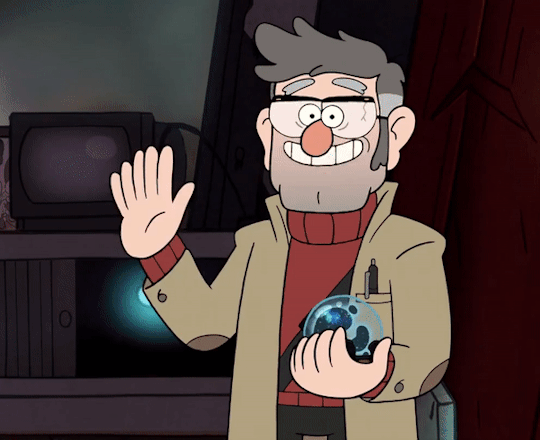
20 notes
·
View notes
Note
ok for angst then: do you think roy ever unintentionally scares jamie? bc as much as roy ISN'T james tartt, he is an older man with anger issues, a history of violence, who is constantly telling jamie what to do / how to play. and i say unintentionally not only on roy's behalf but also because jamie DOES trust roy so so so much, IMO, but his body's reactions might not always listen. how do you think they'd deal with that situation?
Ooh great question. Going to try to express myself as best I can here because I know this is a hotly contested topic
Personally, I don't think Roy reminds Jamie of James very much if at all. There are superficial similarities, but Jamie's relationship with Roy is so different from his relationship with his father that I don't get the impression that he sees them as analogous in any way.
For one thing, Jamie does what James tells him to do because he's "fucking terrified" (as he says in Mom City) of him, which makes sense, because grew up knowing that he'd be assaulted if he didn't do what James told him to do. Jamie's obviously not scared of Roy - he spends the entire first season disrespecting his authority as captain, calling him names, and starting physical fights with him, which he wouldn't do if he saw Roy as a threat. His devotion to Roy comes from a place of respect rather than fear, which creates a completely different dynamic than the one he has with his father. Jamie knows that Roy is very talented, very experienced, and has his best interests at heart (unlike James), and he freely agrees to let Roy train him on the basis that he believes Roy legitimately has something to offer him. He describes Roy telling him what to do/how to play as "motivating" and "encouraging" because it's something he actually wants and benefits from
Wrt the yelling, I don't think it really bothers Jamie all that much in the context of the workplace. There's a scene in the locker room where Roy is cussing everybody out at the top of his lungs and Jamie is standing right behind him laughing lol (and ik people think that was a character break but Phil says it was scripted and I Believe him). Jamie's spent his whole life in men's sports, and I'm sure he's plenty used to being yelled at by coaches. The only time Jamie has a visceral reaction to yelling is when Ted is telling him off about practice in Two Aces, and I think that's because he sees Ted as a father figure on a personal level in season 1
HOWEVER Jamie almost definitely has c-ptsd, and I think Roy has certain habits that could trigger him in some situations. For example, there's a scene in "headspace" where Roy and Keeley are fighting and he storms out of the room, shouts "FUCK," and slams something (which James does in "the hope that kills you"). I think that's the kind of thing that would be problematic in a relationship with Jamie moreso than the training stuff
The best option would be for Roy to talk to Dr. Fieldstone about it, and I think at the point the s3 finale left off, that's exactly what he would do. He'd probably feel incredibly guilty and I think he's at a point where that would drive him to commit to finding better coping mechanisms.
They'd also have to have a conversation about it of course. Set boundaries. "I love you but you cannot walk around here slamming doors and breaking shit that isn't okay with me" etc
68 notes
·
View notes
Note
May I have a ramble about your favorite WIP?
(Any topic you wish My leige)
I'm so sorry it's taken me a thousand years to get to this ask. Thank you for being so patient. :)
My favorite WIP...
Well, I have 2 in the works;
my original novel, "Out There: The 1K" (editing book 2 of the duology)
my Getting In Deep fan fiction, "A Test of Will."
At the moment, I'm happily working on "A Test of Will." I love writing it, I love the characters, the plot I've come up with, delving into the details, and being in Will's head the whole time.
MY FAVORITE...
...Is "Out There."
It is my baby. My pride and joy. My heart and soul. I've been working on it since September, 2018.
If you don't mind, I'd like to go off on what I love about it.
None of the characters are based on a real person - not even their appearances. The closest I get to using a picture to represent a character is a picture of Eugene Fitzherbert from "Tangled" as inspiration for Yune Darrak's appearance.
The worldbuilding is such an adventure! I have an entire galaxy of my own creation to build, expand, change, destroy, and save. I love putting in small details about the characters and worlds. I create bits about their culture, the things they're used to, social details that play a hand in how they act.
I've got an intergalactic coffee chain called "Darkmatter." I even designed a logo for it. :D
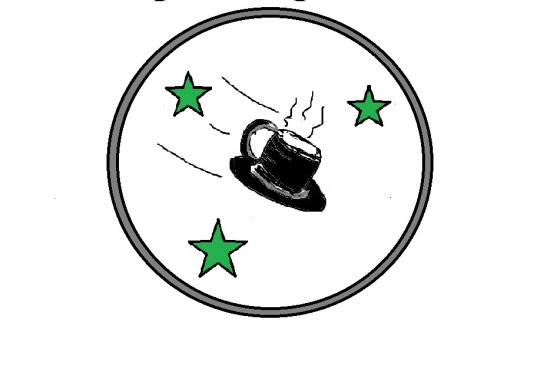
It's basically space Starbucks. :)
In book 1, there's one scene I included where Yune takes the kids (Will and Terra) to a Darkmatter in Cos Besta on the planet of Ilthall. The scene shows an o'alli girl (a blue skinned alien) bored as hell behind the bar. It shows that even on another planet, retail life sucks.
Yune is a coffee addict. Their to-go cups show up in different parts of the ship where Yune has abandoned them. That bachelor life on a spaceship. :)
In my universe, there's coffee and chocolate.
Period.
I am God and this is my playground. If I want chocolate and coffee, there will be chocolate and coffee. And yes, I created lore for why it's in space.
THE LORE ALL CONNECTS!
I created a linguistic translator and how it functions.
Coming up with the 4 human species was fun. The characters only know about 3 of them until book 2.
THE HORIZON!
Oh, my lovely, lovely ship, The Horizon. <3
The Horizon is a mik-human designed ship from Mikra's infamous (and dangerous) orbital shipyards. It's an ACC-1200 Mercury class mid-size transport vessel. ACC = All Crew and Cargo. It's function was to sustain a crew of 4 on long-haul journeys, so it has all the amenities people would need to live and be somewhat comfortable in space. It's built with the anatomy of mik-humans in mind. Masakan-humans (who are similar to terran-humans - Earthlings -) and most other humanoid species would find everything just big enough to be challenging. Mik-humans are the biggest, most dense, and strongest of the human species with adults reaching a maximum height of 8'. The average male adult is around 6'6" - 7'8". The average female adult is 6' - 7'5". Reaching 8' is rare.
This is Yune's ship and his home. It becomes Home for the main cast. The ship has a personality. It's a character on its own.
I designed the entire ship from the ground up.
Deck 1: cargo deck.
Deck 2: command deck.
Deck 3: crew deck.
THIS SHIP HAS STAIRS! :D
And 1 central lift.
All 3 decks and everything on them down to small details like Yune's yellow reminder post-its (called "Stik-Its" in universe) stuck to different spots reading 'replace this' or 'Find C.I link. Crate 2B,' or 'Fix this,' or 'Get parts from crossroads station,' or 'Bad junction. Zappy.' ect so he remembers what projects he didn't get to yet.
The medical bay has a hologram that's pretty much the ship's AI. Yune's only used it a few times.
Since he's been the only one onboard for 2 out of the 5 years he's had it, he modified the AI to respond to vocal commands to perform functions he either can't do because he's doing something else, or needs help with.
I did a rough sketch of the hull design a while ago, and tried to create it in the Sims with just the base pack

I know that ship from top to bottom, and she is beautiful. She's perfect. She's a mess, but she's perfect. :) If I could ever find a program that lets you design a spacecraft so that you can tour it in 3D, I would spend all of my time creating the Horizon.
Yune named it after he stole it. He named it the Horizon because his engineering teacher - Gregor Ryder, a 7'1" burly mik-human, the only person in his life up to that point to ever truly care about him (that he remembers) and who took him under his wing, gave Yune advice when he was at his lowest;
"There’s a spark inside you that shines brighter than anything in the sky, and no one can kill it, because you’re stronger than they are and they know it. You made it this far, you can keep going.
But you have to look up. Keep your eyes on the horizon. Keep moving. As long as you do that, you’ll find your way out. You’ll break orbit. You’ll reach the stars, because that’s where you’re meant to be. That’s where you belong."
VELCRO is called SHRIPP , named for the sound it makes. :D
There are programs and movies people like to watch. Yune's favorite show is "Laki Rift," an ongoing drama. He got Terra into it, so they're both Laki Rift fans.
Will is gifted a tinkertoy-esque engineering set call Kinetics. Very simple, but hey. :) He's constantly leaving pieces around the ship (it is his home after all.) Selka's always telling him to pick up his toys or she's going to put it away.
All of the Milky Way galaxy has NOT been explored yet. 3/4 of it has.
Selka's ship, the Tapheila, is pristine. It has a class 5 Adakorian hyperdrive that Yune wants to be left alone with. :)
The Horizon's lounge on the 3rd deck has out of place furniture bolted to the deck, rugs, a galley that smells perpetually like burnt walnuts and toast, and Selka has a meditation cushion toward the corner in front of the wide panoramic window.
Selka is an Ai Hiri sen - kind of like a knight status in the Jedi order as far as skill and ranking goes, but not the same. And they don't make the same stupid mistakes. Their discipline is based around honing their mental abilities gifted to them by their deity, Shora - (which is how they interpret the Source Field, or the "Light.") They can connect to the Field the same way an altaran naturally can by using a large amoradite gem known as the Eye of Shora. The Ai Hiri tend to stick to their solar system to protect it, and stay to themselves. They don't go out "fighting for justice." They're more like monks...who can fight. Those who venture out usually become advisors for high ranking leaders. Outsiders are not allowed into their mountain top temple on their home planet. An Ai Hiri is more powerful than an average felorian, and has more mental abilities besides the two that all felorians have; empathy and telepathy.
Selka left home because she didn't think it was right that the Ai Hiri stayed out of the fight against the Keth. She thought they should be out there protecting the innocent from the Keth and the dark forces of the known galaxy.
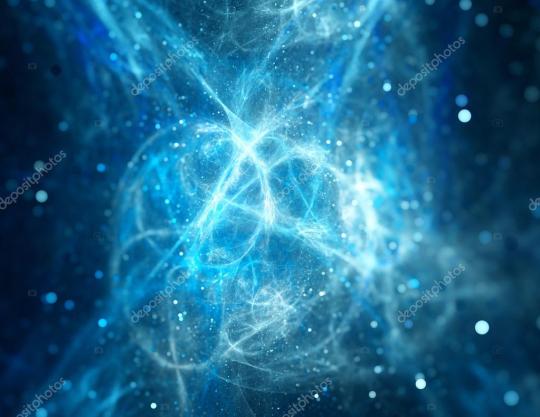


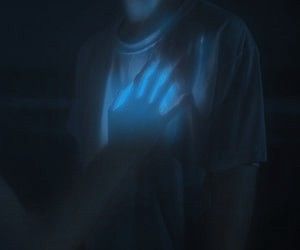
SOURCE ENERGY!
The power the kids can use is a blue energy that's unseen by everyone except for 3 other people. Creating the Source Field, and explaining how Source Field energy and Living Source energy work - the nuances of it - took me a while. I keep the mystery of it in there as well.
It's not the Force - they're similar in many ways, but definitely not the same thing. They don't "work" the same way. A Source user would have a difficult time navigating the Force, and vice versa. They could do it, but it would be challenging.
Yune's crystal is the one that I wear. His has a living source in it. It's sentient. As is the planet, Ilthall.
Creating the world through the eyes of Will and Terra who are seeing all of this for the first time since they were taken from Earth and then kidnapped is tricky, but fun. It's like they're the reader, learning as they do.
There are details about the galaxy itself that I can't wait to write about.
Like the Great Galactic Garbage Patch simply known as "The Patch."
It's a 2 light year diameter region of space filled with space junk that's been accumulating there for thousands of years by thousands of species. It's the galaxy's dumpster. It's been there for so long, it's a large trash-based nebula. It was initially formed around a small star away from the populated worlds to keep discarded ships and whatever in orbit, or some would fall into the star. It's obviously expanded since then. It even has condensed bodies of compacted trash asteroids (trashteroids) in various sizes called Junk Moons, or Mudballs by Spacers (nomadic people who live primarily in space). Some of them create their own gravity and have their own moons of trash orbiting them.
I got the idea from our own Great Pacific Garbage Patch.
For context, our solar system is 1.8 light years across.
It's big.
There's also the Kelset Void.
It's an apx. 1000 light year wide expanse of dead space that contains small pockets of real space swiss cheesed all over it. Ship's cannot jump to hyperspace within dead space zones of the Void. They have to jump from pocket to pocket. If you leave a pocket, you're stuck "walking" until you get to another one. There are paths charted between them, and some of the pockets contain entire solar systems.
What makes it impossible for ships to jump to hyperspace is because the void part of the Void is completely ....devoid... of Source Field energy. Making the jump requires the presence of the Field.
The lack of the Source Field would make anyone in tune with the Field - like Will, Yune, Jeina, and Terra - feel cut off, alone, like they're suffocating, and blind. They would get irritable, have various physical issues, hallucinate, and feel 'starved.' People in tune with the Field subconsciously "read it" and use their own living Source energy in conjunction with it. Without it, all they would have would be their own Source energy, that of others compatible to them, and the Field energy trapped in the ship. Many would keep a Source flare (a highly concentrated flare of Field energy) on the ship when needing to pass through the Void just in case to keep themselves going and maintain their sanity. That whole area to them feels dead. They do not like it and want to avoid it.
Source Field energy is the life of the galaxy itself.
The Kelset Void is akin to a cancerous lesion, or a bullet hole. It's dead space. Literally. That area of the galaxy is dead.
And then we have the space dwelling creatures called ASTROTHOPIDS. :D These guys are extremely durable and can thrive in both a vacuum and various atmospheres.
They have 3 sub species:
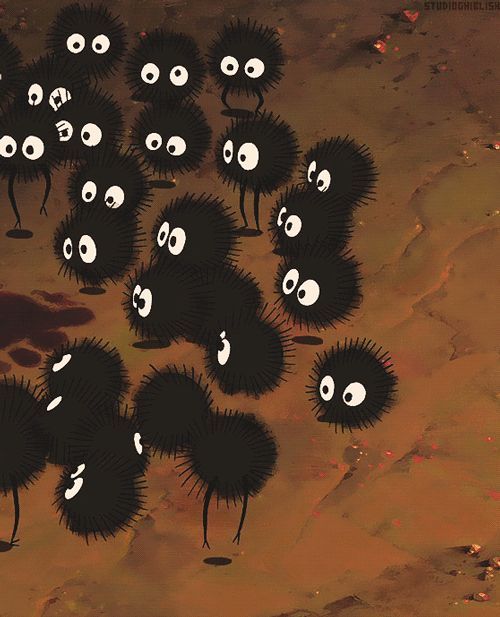
Carbonites: (Inspired by soot sprites. They look similar, but are definitely not the same.) These soft, fuzzy, 4-legged little guys can fit in the palm of your hand. They live in colonies that share one brain cell and keep losing it. They eat metal. Although dumb as rocks, they are more intelligent in other ways. They either have black fuzzy bodies or navy blue fuzzy bodies. Albinos are pale pink. You can find these guys pretty much anywhere there's metal. Their mouths are too small to really harm a human. One or two, or a handful carbonites can't cause much damage. But a colony will wreck your shit. They can live up to a hundred years - if allowed to live. They're not fast breeders, but fast enough to create colonies. They're considered pests. When on a spaceship, they can float.
(I love these adorable little dumbasses. ^_^)

Oobo: Bigger versions of carbonites, about the size of a loaf of bread, with more intelligence and 6 legs instead of 4. They live mostly in space. They're also metal eaters. In the absence of metal, they can survive on nebulonic gases, as can all astrothopids. They can live up to 200 years - again, if allowed to. They come in star blue, black, and albino pink.
Spacers hate these two because of their metal eating habits. Putting their ship through a macryon radiation scrub station (like a car wash) is how many prefer to get rid of them.

(Patch on Etsy)

(redbubble Isopod)
Ceenak: The much, much, much, MUCH bigger astrothopids that can live up to a thousand years or more. Their design is based off tardigrades (water bears) but not an exact. There are physical differences. They have 6 legs, a wider, bigger mouth, no fuzz, two very large solid black eyes, and a shell like an armadillo.
They eat iron asteroids and live in asteroid fields. They're kind of like bees. They're the 'clean up crew' of the galaxy munching on asteroids. They live in space and travel in pods. They can become large enough to completely swallow a mid-size ship like the Horizon without a problem. They are incredibly intelligent, and damn near impossible to kill. Ceenak create a crystal within their stomach called a mycathyst that felorians (Selka's telepathic and empathic humanoid species) use to enhance their mental abilities. To obtain one, a felorian puts a ceenak into a trance while another goes in and harvests the crystals. They used to kill them (they figured out how) for the crystals, then quickly learned how to subdue them and not to harm them. Felorians value life. The only felorians who are able to put a ceenak to 'sleep' are the Ai Hiri - their order comprised of those with high mental prowess. The only other gem more potent for felorians is the rare amoradite.
All astrothopids see primarily through the Source Field. They have a special affinity for altaran-humans due to altarans being the only sentient species who are in tune with the Field and can use their own living Source energy. They can see the "light" of an altaran and are attracted to it. The love the way it feels. Altarans learned how to use that to their advantage. They would sometimes keep them as pets and work with them, but would not kill them. Oobo are like cats. Altarans can also connect with astrothopids - even the little dumbasses. Thousands of years of working in a symbiotic relationship have allowed astrothopids to trust them.
Astrothopids will instinctively act to protect an altaran in danger.
Ceenak have been known to defend altarans, keep them alive, and take them to a safe place.
THEN THERE'S......
An old Yondi and Altaran legend, "The Tale of Belaketh and Yuneath." - it explains how the Yuneath - the third moon - became the ring, and how its Light (it's Source Field energy) and that of Ilthall's protects Ilthall's children from the eyes of dark forces beyond the two sister moons. Ilthall's children = anyone born on that planet. They have a deep connection to that world.
The planet is sentient, sparsely populated, on the outer rim, and actually does protect them, and can affect them when they leave if they don't ask for permission first. It's a legend no one takes seriously. Feeling homesickness, headaches, dizziness, feeling like you left something behind and need to go back, and nausea is normal. The need to go back the entire time you're away is also normal.
It's not.
That's the planet basically saying, "I did not give you permission to leave. When you get back, you're grounded, and we're going to have a little chat."
If Ilthall deems the danger for someone leaving is too great, or she lost them once and refuses to lose them again, she can render them unconscious until they re-enter the moons' boundary. This has happened a handful of times in recorded history.
This only affects people born on or around Ilthall within the dual moons orbit.
And DARK MATTER STORMS.
Basically what it sounds like; A cell of roving dark matter in space.
Thankfully they're rare. The odds of running into one are small, but it happens enough that Spacer culture made up stories about them.
They're undetectable. Ships can't jump to hyperspace in them, so if you find yourself in one, you have to slog through it and hope it isn't a large storm you'll be stuck in for days, weeks, or months. Communications and sensors don't tend to work in them either. A combination of chemical reactions within the gases of a dark matter storm with the Source Field woven through it cause "thunder" and "lightning." The Field exists in it in ribbons of energy that are carried by it, so that's not why ships can't make the jump. It's because the hyperdrive activation will react badly with the elements in the storm. If you try to jump to hyperspace... BOOM.
And of course I wrote a short story where the Horizon family (Yune, Will, Terra, and Selka) get stuck in one.
There's so much more I love about this galaxy!
This is just a fraction of what I've created. :D
I want SO BADLY for people to enjoy the stories enough that they want to create their own stories in this galaxy...which is the Milky Way galaxy. :) I want people to find themselves in one of the One Thousand and write their own adventure.
I've wanted that from the very start.
#writing#writeblr#my favorite WIP#You said to ramble. I took that as a challenge :D#worldbuilding#long post#sci-fi#original writing#One thing I have in common with George Lucas is that we're both shit story tellers but Great worldbuilders.
3 notes
·
View notes
Text
episode 7 thoughts dump (part 1/2)
(this will be referencing this post of mine and this one too)
(part 2 because this is getting too long)
ok so putting things under a cut again bc spoilers obviously <333
(edited a bit because damn i wrote this on a whim)
OK SO ! most of my predictions are. somewhat correct, if not just misplaced in the wrong areas of the episode
the episode IS centered around rei having to realize that kazuki's role in the house is difficult because he has to take care of so much (laundry, cooking, getting miri ready early and sent off to daycare) so i wasn't wrong about that
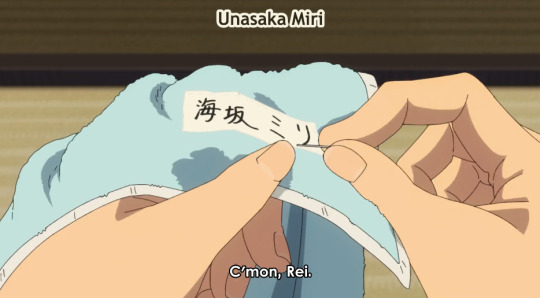

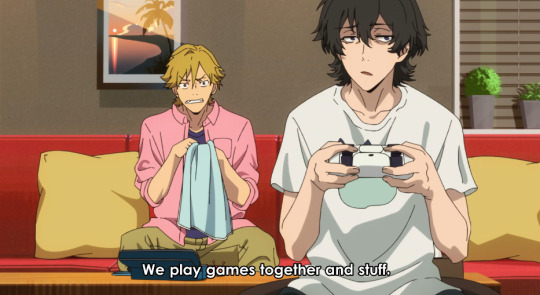
this conversation is very nice to listen to as well because the thing of kazuki taking care of almost everything if not everything in the house is finally addressed! and they talk about it! somewhat. to mixed results
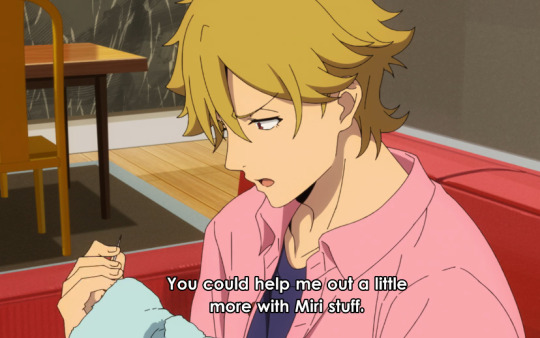
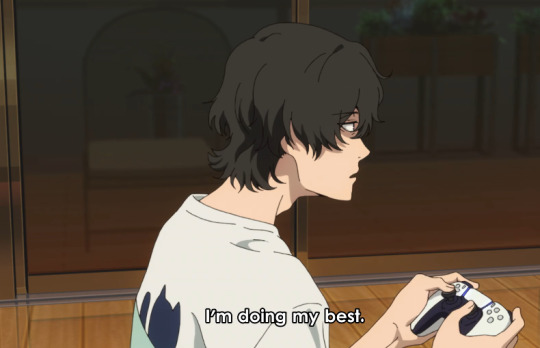
and he is doing his best my god he is doing his best you're doing so great you cringefail of a man (/pos) but i'm glad that this episode pushed him to a point where he just realizes he has to help kazuki more
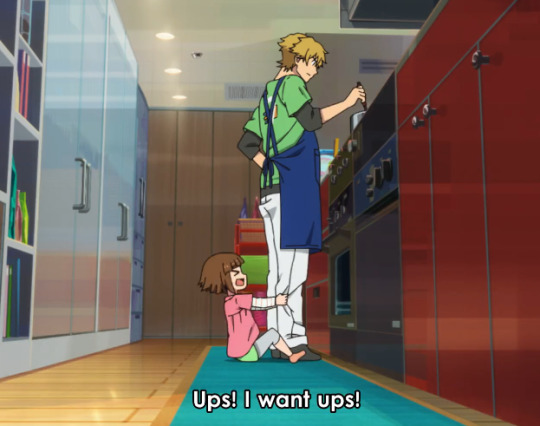


this minute pause spoke to me so much because he was about to yell at her but stopped himself before he could..... amazing little detail
OK. NOW. THE SCENE THAT SPAWNED THIS ENTIRE POST.
there must've been some kind of falling out between rei + miri and kazuki because he was screaming "I'm... not your housekeeper!" during dinner
i'm suspecting that they finally got on his nerves if they never pick up after themselves properly or just the small stuff piled up onto kazuki and he had enough despite usually not really minding the fact that he has to do most if not all of the house chores
but another theory i have is that the scene with the photograph is connected and because of the stress, it leads up to him taking it out on rei and miri. i'm distraught i don't want to see this episode but i have to. mfs gonna have a sk8 episode 7 situation and i'm powerless to stop it
recalling this from the second linked post, they do have some kind of falling out!!! and it does refer to the fact that they don't pick up after themselves!!! (and that they don't try to make it easier for kazuki himself)
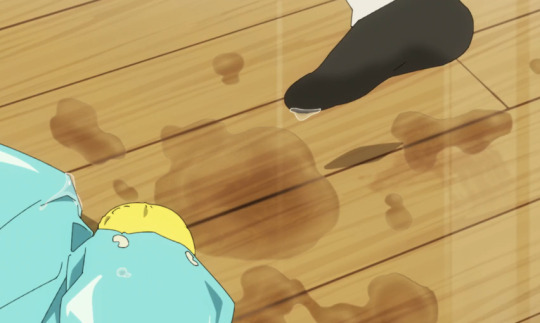

the other theory is wrong because the thing with his wife doesn't really come up until karin's in the picture ok no i worded that incorrectly, thank you person who replied under the post
the scene is connected! but it did start off from the start of the episode itself, and his the stress that leads up to him going on strike is just from rei and miri not appreciating what he does enough..... poor unappreciated malewife
but yeah they did end up having a sk8 episode 7 but without them actually arguing in person, kazuki just dipped and left early in the morning
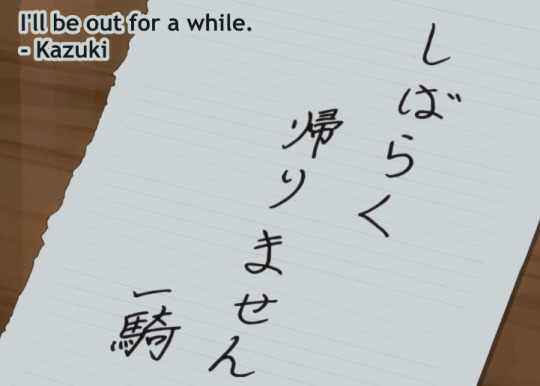
he really said he's not going to be coming back home for a while and they can fend for themselves



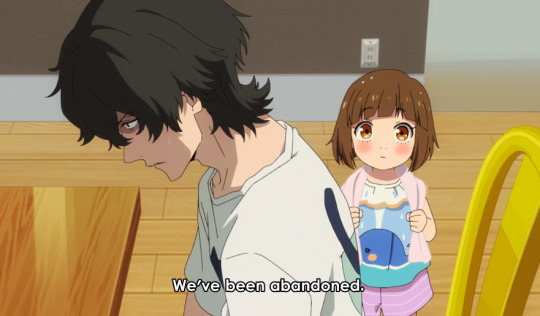
and kazuki seems to be on a solo mission, which is probably something rei and miri knows about considering they dont look too panicked by kazuki’s absence (rei looks a little frazzled from the daunting housework chores he has to deal with)
(episode 7 trailer post) ok so the solo part is wrong, but now we do know that rei and miri know that kazuki's out of the house and rei is frazzled by the housework
the day of reckoning has arrived for one suwa rei frfr..... it only took one whole day without kazuki doing things for him to realize

kazuki was nice enough to leave notes around for him so he doesn't get TOO lost trying to prepare miri
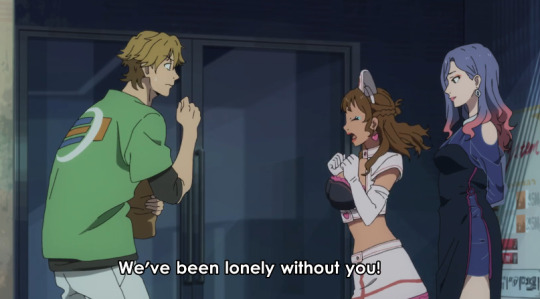
this means that since they got miri, he hasn't been going out to fool around in the night life and is at home taking care of miri and rei..... interesting
onto the more meatier part of the episode, THE TRAUMA !!! ill go back to the fluff when we're done here <3333 let's start with rei's since it's the tamer part and since we're on the topic of rei having to experience what it's like to be the sole caretaker of the house for once
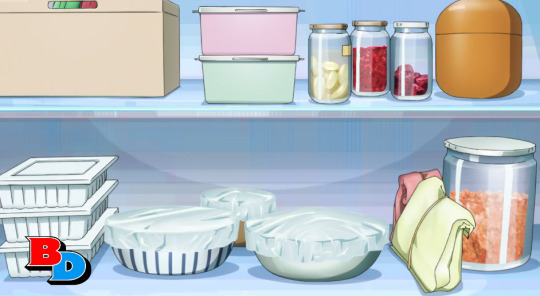
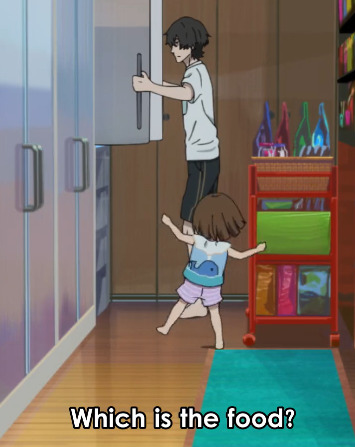
he cant cook and doesn't know which plate in the fridge is for eating
this reminds me of the very first episode where kazuki tells rei that he left food in the fridge for him that he didn't eat because it was cold

maybe because kazuki papa wants you two to have a balanced meal !!!! also the laundry left out on the couch.... did kazuki just never fold it?
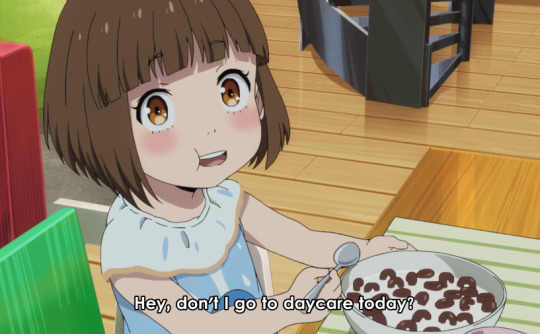
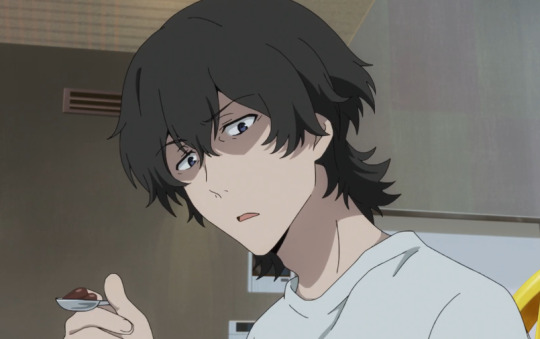
he does not know her schedule At All (to be fair, so does she in some way but the point stands)
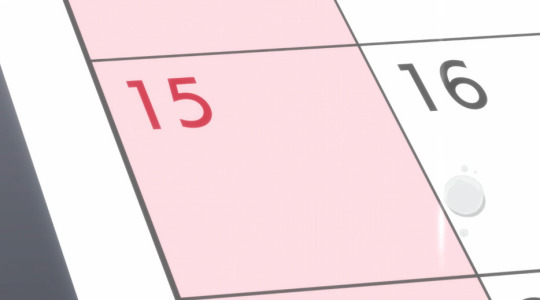
but he does have a calendar that he did not check before leaving probably out of panic
time to nitpick a little at rei's choices with good intentions (he's doing his best but these are Not It fr)

why is miri being exposed to the rain like this!!! should've taken the car i feel like because this right here

is what leads to this
poor miri got sick and rei doesn't know what to do so he immediately calls kazuki who doesn't pick up

so he thinks of an alternative,

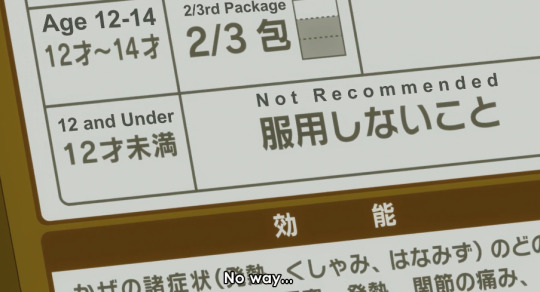
but the medicine isn't allowed for anybody below 12 so he thinks of another alternative,
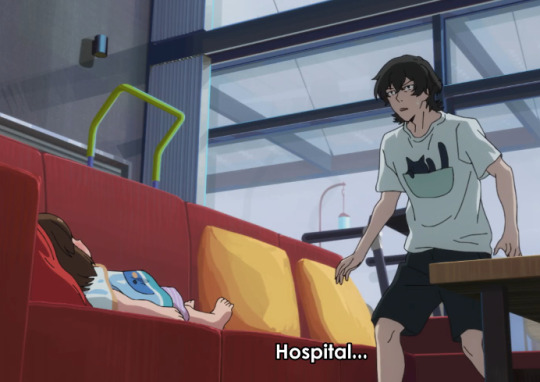
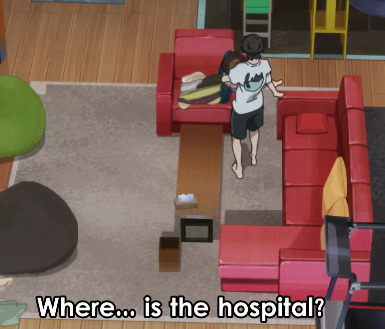
but he doesn't know where the hospital is!!! so he ends up in kyutaro's doorstep as a last resort....
#i'm way too insane about this so i'll make a part 2#buddy daddies spoilers#buddy daddies#edit bc i was writing this half awake and running on pure adrenaline bc new bd episode
21 notes
·
View notes
Text
The Crown made Diana seem... awful and crazy.
Hello, to all you beautiful people!
This author hopes all is well with each of you! After two solid months of illness after illness, I am back for a new post. Slowly, I inch back into the habits and hobbies I enjoyed pre-illness. There are two things I want to discuss; I should really write out two different posts and include a story of the last time I spoke with my mother before she died when I was on the run back in the old days. But, this author would like to remind you of the ‘taking it slowly’ part.
Therefore, I will say this briefly before I move onto my main topic. Knowing now that Her Majesty the Queen had cancer the last few years of her life, yet Harry did NOTHING to take advantage of that time… well… let me just say. One day he will wake up, and it will be a miracle if the guilt from all his decisions doesn’t crush him whole.
With that, I now would like to discuss the fifth season of The Crown. I’ve watched all five seasons of The Crown, and I have never found the show to be insulting to the Monarch. If anything, I find the show makes it look like Her Majesty had a short stick and the people around her didn’t make it any easier. Diana especially.
Before Diana, it was either her sister, her husband, or possibly even her heir.
The fifth season essentially suggests that Diana was too stupid and paranoid to listen to her brother when he called out the inconsistencies from Bashir. There is a literal scene where Diana calls Martin out on all of his inconsistences (re her brother’s appeals and begging her to not go through with it). She has him in the car and she tells him of how her brother had been keeping notes from all the conversations, that he was caught up in many a lie. And yet she was so paranoid, she couldn’t see the reason for the mania. (I’ve been there, not judging, but it is what it is).
The whole entire show makes it look like Peter Morgan is in love with Her Majesty, but everyone else is too selfish and inconsiderate to try and make things easier for the Queen. I’ve never been one of those who saw the show as a bad thing, as long as the person being portrayed was the Queen. But this fifth season explicitly left someone out, which I found odd.
REMEMBER, the show is utter fiction. My fellow AMERICANS, The Crown is a work of FICTION. It is loosly based on factual events, and that is being a bit too generous.
The show also highlighted the Romanovs, and it showed the introduction of Penny to Prince Philip's life. I do wish they'd not make the Queen seem so hysterical with the emotional side of their marriage. They either make her seem superficial, or like she is so good at looking the other way it hurts Prince Philip that she doesn't even try to catch a peek. Like Philip was so unfulfilled he needed the Queen to complete him. Puh-lease. Those two were each other's rock. And they did what they needed to make it work. None of our business how that happened, now is it?
If I were Netflix, and I had an ex-royal, especially the second son of Diana, Princess of Wales on the payroll, wouldn’t it make the most sense to remind people at every opportunity that I had the Spare on the payroll? I mean, the whole point is to remind people of the upcoming content, not the stuff they already put out, right?
So why is it that little Harry didn’t have more than a hand full of lines the whole fifth season, yet William is a breakout role? Diana’s character even says that “all the love the people have for me has transferred to William,” after the interview fight. It was horrific the way they portrayed Diana.
Diana came off as a manipulative woman who knew she was being used and used it to her advantage daily. Even when they cover the divorce, they have a scene where she’s asked to be silent post divorce. She tells the Mediator character essentially that her silence would cost eight figures and start with a three. She hangs out at a hospital and love bombs sick patients just to attract the attention of the Khan (who did surgery on her acupuncturist’s spouse). She uses her children to sow unrest and win favor with the Queen.
Even one scene shows William and the Queen having tea, and the Queen reminding William that he is a child and shouldn’t be worrying about his mother. Then, she eventually has William with her when Diana goes to give her a small warning about the interview coming out with Bashir. Every time you see how Diana used William as a pawn with the Queen. Like she knew the Queen would see her using him, feel empathy for him, and show her favor. And it worked. It legit worked. If this is who Netflix is painting the Diana, Princess of Netflix to be, how can Harry even look himself in the eyes in the morning? I suppose with a LOT of exterior assistance.
And that reward is a threat, btw. I imagine that will be his official straw. Either that or King Charles III has already offered him a deal, and this is his way out. I.E. Old poppa will take me back now if I get rid of her… Harry was/is an addict. He needs frequent dopamine releases to stay interested. She is running out of interesting things, I am almost sure.
If Charles is waiting for the book re the titles, he shouldn’t. I keep checking often to see any changes, and there have been multiple updates to different biographies. Yet the succession withholds all titles for both of the kids. It says a lot. But then again, does it?
The Prince of Wales website still has Charles and Camilla on it as the Prince of Wales and Duchess of Cornwall. Netflix managed to come across very fair regarding Camilla and Charles. I am telling you, it seemed quite literal and quite personal. Like Netflix was getting revenge. But who am I?
It was like they were sticking it to them both. They know Americans won't fact check, and they essentially made Prince Harry's childhood irrelevant in one of their biggest shows. Then, they painted William as the kid who had to parent his parents. How they continue to work with Netflix... wow. Just wow.
IT’S BEEN TOO LONG! Writing again soon, sending love! #royals #thecrown #princeharry
34 notes
·
View notes
Text
like again this show trying to take a serious topic and wham bam thank you ma'am it in one episode, and although it's not as egregious as last week's 'the broken mirrors are a reminder that mismatching cutlery is ok', it's def in the same ballpark
like i get the plot beats they wanted to hit:
create a situation where isaac would find out colin is gay without anyone else finding out
show and contrast all of keeley's romantic relationships reacting to her in distress esp re: sexuality, jealousy, and accountability
but like -- if you're going to do that within a very relevant storyline about privacy violation, systematic misogyny, and sexual harassment fucking actually do it and don't make that serious thing merely something to be twisted to the plot points you want to hit?
the lead up to the isaac & colin scene is him telling ppl to delete shit off of their phones? like it undermines the point that they'd all previously been talking about that pictures and videos being sent between two people are their private business and the only one to blame is the hacker. yes!!! but then 180 into isaac demanding everyone delete everything. like i'm interpreting it as 'we're famous so we're targets and any woman who sends us stuff is at risk for getting the brunt of anything that happens bc of misogyny', but the placement of that in the scene after the reveal that keeley was hacked didn't make that clear? it felt like a clumsy bridge just to set up the moment btw him and colin. idk man felt like the plot point they wanted to get to undermined the message big time, and it was a weird ass scene to begin with besides.
and then keeley. she was completely made to be passive in this whole thing. like ok i get that the point was to show jack's conditional support, and an her being an example of how you need 'patron' to spell 'patronizing' (and an example of how jack is 'get away with hanging out with epstein' rich and that's a class keeley will never belong to), but again you choose to do it with this particular story line then you've got to actually deal with it! keeley is a pr professional -- what the hell is the point of kjpr if she can't even represent herself, and her entire story is about her reactions to everyone else's takes? the 'men that act like teenage boys are the worst' line to a teacher spreading topless photos of a 15 year old around the school whaT THE FUCK??? just don't fucking add that line??? why would you write that line??? at least roy reacted properly to jamie's reveal in amsterdam by pointing out how traumatic the situation was? but this was like oh boys will be nasty boys. esp couched in the context of leaked private media whY WOULD YOU???
just idk what i was supposed to come away with this episode with? hacks are a gross violation of privacy and people should be allowed to be sexually expressive, but also delete any evidence of that sexual expression? don't feel ashamed but boys will be boys so yeah kind of be ashamed. keeley won't apologize but i'm not sure if she feels regret or not (when she shouldn't!), and she wasn't allowed to show her professional competency through this whole thing either?
idk the whole thing was really fucking awful. this show needs to step far the fuck away from The Tough Issues if it can't be fucked to actually take them seriously. makes me really unsure about whatever they're gonna do with colin...
#again sorry to be a negative nelly but what the fuck man what the fuck#like last season went up against some real shit but i never came away from an episode feeling gross#but this made me feel gross#aww flashback to my old 'ouat critical' tag days xoxo we truly can never have nice things#ted lasso spoilers#ted lasso critical
19 notes
·
View notes
Text
Hell’s Paradise EP2
aka: cornucopia bloodbath
Are we gonna start off each episode with the topic of beheading? We’re two for two.
So Sagiri actually wanted to become an executioner because she saw how perfectly her father made his cuts.. I don’t necessarily wanna call that cute but hurray for following in her father’s footsteps I guess?
Oh, good to see she’s not completely heartless about the whole process. Well, I imagine beheading others would instill fear, grief and other emotions into anyone and would probably take many attempts, or several years even, to not feel pain anymore while doing so.
Also, those lifeless bodies we saw in the OP/ED surrounding her now have context with them being her doubts, like right now as this red-haired man explains with the truth reflecting in her blade.
I shall never skip this OP by the way and yes I’m gonna comment about it each week. I heard the full version of it the other day and it’s just as lovely.
Ooohh finally getting little looks at some of our cast like Chobei, Yuzuriha, Nurugai and Tamiya. Same with some of the swordsmen with Shion, Fuchi, and Toma somewhere I’m sure.
All the criminals are throwing their rage at the shogun while Gabimaru is just over here complaining that he can’t breathe with that paper mask over his face.
This dude unrolls a certificate to show them the official pardon but it’s hilarious since none of the criminals can actually see it with their eyes covered.
Yuzuriha knows of our hollow man hm? & despite myself not knowing a thing a out her, I think her voice suits her.
SPEAKING OF VOICES, Gabimaru shares a va with Langa (sk8) and I dunno how it completely slipped my mind last week or how I didn’t pick up on it.
Eh so weird, that poor dude with the flowers blooming out of him is actually still alive?
I’m not entirely sure why, but Nurugai reminds me of Dororo? Maybe it’s the character design somehow.
Oh good lord, large tattoo man just got beheaded with no questions asked.
“Act out in the island, and you’ll be beheaded on the spot.” Yeah that checks out.
“Naturally, if your monitor dies, whether by accident or homocide, you’ll be beheaded.” Glad we mentioned that little bit. But if by some crazy chance they all die, then no one can behead the criminals, right?
“If your monitor isn’t with you, you won’t be allowed onto the return boat.” Oh good, I’m glad we’re answering all my questions right as they come up. So y’all can’t just kill them for funsies because I’m sure they were all just thinking that.
Ya know I was thinking that, there’s way too many criminals here right now and not enough asaemon to monitor them, of course they’re gonna fight for a spot. That and a lot of them just look like randomly placed characters.
Ahha, and looks like our bastard Chobei is gonna get a head start on reducing their numbers. And I know he doesn’t share a va with Bakugo, but that’s all I hear with him, just a little. I have heard him in other things but nothing I remember too clearly.
The fact they can all fight rather well with their hands tied is kinda impressive, I won’t lie about that.
Oh? I assume our main cast are those with these red seals. The special ones with great abilities.
Our man Gabimaru is actually quite the legend huh? Yet he hasn’t move an inch since coming here.. he’s so chill. I love it.
Not me somehow getting Nozel and Noelle vibes when this Eizen man tells Sagiri she isn’t suited for this kind of job. Go prove him wrong girl!
Not that I want her end Gabimaru’s life, but I hope our girl manages to get over her doubts..somehow.
Goddamn, slicing three of them one after another like that..
“Not killing people if you don’t have to is the most natural thing in the world.” Gabimaru you’re such a kind soul.
Holy shit man! You cut the dude’s throat with your bare hands how??
And now he’s just bit another guy’s throat apart.. Gabimaru is literally a beast.
Oohh the scene from the trailers! With him standing in the water with the bodies around him!
“Is it possible that what I needed wasn’t the strength not to fear killing but the resolve to take on the burden of that fear and the lives I took?” Ah perhaps, I’m sure Sagiri will find her answer eventually.
Like Gabimaru last ep, I didn’t expect her to actually have emotions like this. It just didn’t seem like something an executioner would show ya know? So I’m happy we got a look inside her mind and past this time.
Ah so aside from our cast there’s seems to be a couple more criminals joining the party that I’m not familiar with.
Same with the other executioners too, but I finally spotted Toma and got a clearer look at Tenza!
“There is no danger.” Well that’s a blatant lie if I ever saw one.
9 notes
·
View notes
Text
KinnPorsche Rewatch 2023
Reminder: as we go into heavier topics in KP (dub-con/non-con, toxic behaviors, etc.), I will not be doing deep dives. I’m planning on taking this just below surface value as these are literally thoughts I have in the moment as I’m watching. Thank you.
Episode 9 Random Thoughts
I just never trusted Tawan, even in my first watch through. I felt bad for him, but that was about it.
I really do wonder who poisoned him, though. Seems like a Ken thing maybe? Since he's a double agent and all? I dunno.
Once again, Tankhun has the best instincts of them all. Never trust the sketchy ex, boys. And also Big knowing not to trust him, either. I get why they didn't just throw him out, but he shoulda just gotten tossed :')
It's literally the minor family. It's always the minor family. Gun has a complex, remember?
My dumbass feral cat boy getting worn down by the cute boy he was gathering info on. Inspiration for the singer-songwriter.
Arm is the only one taking note of the relationship that's right in front of their damn eyes.
Yes, but Pete, you and Vegas are destined to be together. Just go and spy on them. Do it.
Is Tawan trying to lure Kinn in by showing skin with muscle tees? And piss off Porsche at the same time? I don't get the obsession with cutting his shirts lower each time you see him.
What kind of workout is Tawan doing? Wtf?
Yok knows everything, Porsche.
Porsche dancing around in his tighty whiteys is such a mood. Also the song is a banger, tbh.
"Hey Porsche, why is your leg so long today?" Drunk Pete yelling out Korean phrases. This entire scene is something else. Then they just fuck on the couch anyway.
Vegas always knows when Pete follows him. Idk why Kinn keeps sending him to watch them, other than ✨plot devices.✨
Pete getting the stirrings from Vegas putting his hand on his back and the looks he gives. Yeeees.
Oh, Porsche. Not good. Very bad. No spying allowed.
Arm knows better, P.
Why is Tawan, like, constantly in the shower or the bath? Especially when Kinn comes to visit.
Vegas why are you putting your pants legs in the water??? Bruh.
But you and your family are doing things though Vegas??
Oh my god, I hate this scene where Tawan just puts his head in Kinn's lap. Like, please, my dude. Could you be less subtle? All the while, he's fuckin around with Vegas. I just don't like how manipulative it all is. Is no bueno.
Porsche for the love of god. Why you do this? Trust issues all around, bah. I know he was doing it for the right reasons, since he didn't trust Tawan from the beginning (for good reason)... Many thoughts about this whole situation.
I love how cute and nervous Chay is here :') confessing to his crush and Kim says yeah I like you too, I'm just dumb with feelings, here's a cheek kiss, thanks for the gift. Ugh. Too cute, too cute.
I can't imagine all the thoughts rolling around in Porsche's mind. Tawan is consistently showing him what he's actually doing there but he's not showing it to anyone else (except for those that are reading between the lines like Tankhun, Arm, Pete, and Big), least of all Kinn. He's being sickly sweet to Kinn. It's all so manipulative. But that's exactly how the minor family needs it to be. Sowing the seeds of distrust and chaos is the entire point of Tawan being involved in the first place.
And once again, Tankhun has it right.
Convenient Vegas is convenient.
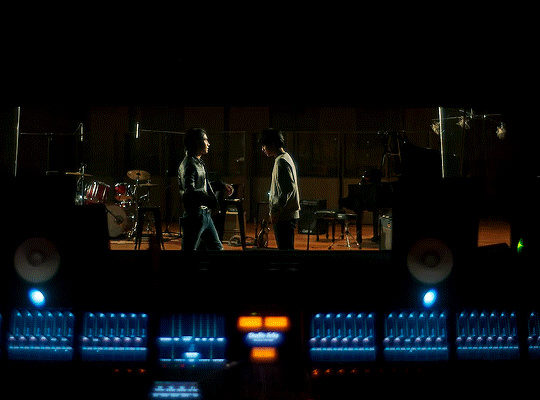
So now I'm finally properly caught up! Yay me. I think these posts peaked at episode 6 because it really is my favorite, but I'm going to keep going because there's so much more to come and it's fun putting my stupid thoughts on the internet.
Episode 10 next 😭 we're close to the end now.
3 notes
·
View notes
Text
Thirteen Era Rewatch: The Witchfinders
I'm re-watching Thirteen's era in lead up to the Centenary and since this is likely going to be my last full re-watch for a while I thought I'd do a post on each ep where I just go over all the things I love, hate or just have some general thoughts on.
I’m saying the reason they didn’t end up at Liz 1’s coronation is bc the TARDIS isn’t a royalist
Idk why but the scene where Becca says she had all the horses shot is really funny to me
Yaz going off on her own to see Willa like the legend she is!! I feel like you can sometimes tell that maybe 13 trusts Yaz to do stuff more than Ryan and Graham, probably bc she’s a police officer and has those skills
They’re the same person

I like when 13 has to deal with shit for being a woman. I think this era does fairly good at acknowledging there’s been a change but not letting that change dictate the entire era. And I love how 13 handles it too, being sarcastic and making snide comments. Love her.
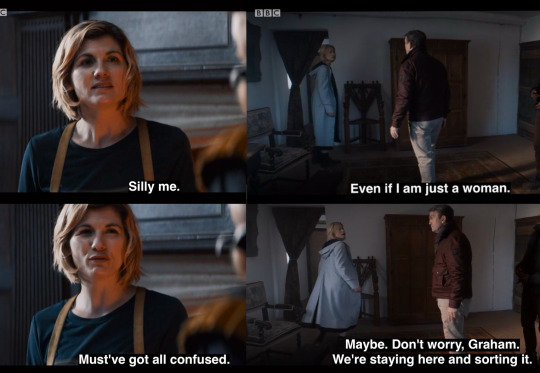
I actually kinda find 13 even saying she’s a woman a bit weird/interesting?? I guess bc we know she doesn’t really give a fuck about that sort of stuff so hearing her ‘be like it is a tough time for us women’ is cool and a bit odd to me idk.
James fancying Ryan. He’s so me. And I think it’s cute how Ryan handles it through the ep. Like they do actually get on a bit. And I like that he kinda plays into it at the end of the ep when he tells James he can’t stay.
Yaz talking about the bullying! I really feel like we know a fair bit about Yaz’s life idk why ppl say they STILL don’t know her when 8 eps into S11 I’m like yeah we know a decent amount amount idk.
Potentially the funniest scene in the whole show ngl
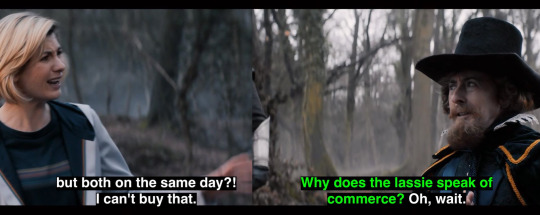
James calling out the Doctor for hiding behind that title makes me scream bc she’s probably the Doctor hiding behind the title the most and she already doesn’t really know who she is and it just gets worse as the era goes on. It’s all connected i stg !!
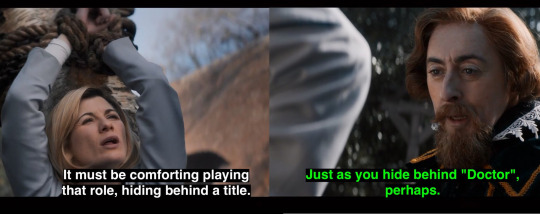
Something something James’ shitty mum making him a twat but 13’s shitty mum/life making her good. But also this reminds me of 12 and his arc of going from twat to not twat and worrying if he’s a good man or not idk

I kinda feel like there’s a low-key mum theme in S11 as well as obviously the dad theme. Like there’s Ryan’s dead mum and nan, there’s James’ twatty mum, there’s Epzo from 11.02’s shit mum, there’s the mum (who wasn’t Really the mum) in 11.09. Idk
Also 13 once again confronting people when the fam isn’t there to see her be Like That properly. Inch resting theme.
This is one of my fave eps of S11, the vibes are just so good, it’s pretty funny, the topic of 13 being treated different for being a woman is low-key but works pretty good. Everyone has something to do. It’s cool.
Character wise it’s probably best for Yaz bc we find out more about the bullying and see her be more police-y and 13 bc of the woman stuff and her chats with James and Becca. But Ryan and Graham defo have fun in this ep too even if it’s not huge character stuff
16 notes
·
View notes
Text
Total Eclipse (1995) — A Movie Review by linklethehistorian (Post 3/4)
(Continuation of review placed under the cut for length and spoilers; proceed at your own risk.)
The Bad
Casting & Acting
I honestly can’t think of anything much ‘bad’ to say in this section that isn’t completely nitpicking; as I mentioned in the previous section, I actually think that on the whole, the cast was very well chosen and the skill level of the main actors is stellar. Even in regards to more minor and background characters, I can still only find a few of their performances to be subpar at absolute worst, and I don’t think that’s really anything worth talking about.
I guess if you asked me to go over the entire ensemble with a fine-toothed comb and find something I thought was genuinely off about one of them in any way, I would have to say that, based on the only existing glimpses we have at Mathilde Maute’s true visage through surviving photos, I think Romane Bohringer is far too conventionally attractive by the modern standard to really make for a convincing close physical approximation of the woman she is portraying, but that is truly me splitting straws because she’s too good of an actor to find any major flaws in her performance and I can’t come up with a problem among any of the others, either.
There is one moment I can bring to mind in scene 39 — during which Rimbaud and Verlaine are on a ship headed towards England — that I feel a single line of DiCaprio’s acting felt extraordinarily weak (particularly the moment in which he says “Oh…my God”), but I’m unsure if this is actually the actor’s fault, or that of the director’s for not trying to get another take and just going with that particular cut anyway.
Writing & Script
Alright, well…this section is probably going to be a bit of a difficult and messy one to tackle, unfortunately; you see, the problem I find as I finally sit down to write this section is that much of what really ought to be discussed in this subsection also happens to belong to another — given that a great deal of this film’s issues lie with things intrinsically tied to its notable lack of historical accuracy.
After a great deal of painstaking debating and procrastination by writing out literally every other subsection within “The Bad” except these two, though, I have finally come to what I believe is a reasonable solution: I will use this subsection to talk only about those issues which are the more broad and/or narrative and technical ones, and which are not intrinsically tied to the authenticity of the events and natures being portrayed, and I will use the “Overall Historical Accuracy” subsection to discuss those issues which are inherently bound to how genuine the ‘facts’ and characterizations within Total Eclipse tend to be.
So, with that settled, I guess let’s get started with my first topic of interest for this area: the script’s occasional inconsistency with its own chosen narrative.
Numerous times within this movie, the writing will initially state a certain ‘fact’ that it seems it would earnestly like its audience to believe, only to sooner or later completely contradict itself through another statement or action — and no, I am not talking about the times where it is intentionally using some form of disconnect between a character’s words and their actions to point out their hypocrisy; that definitely is something that is done throughout Total Eclipse and done very well, but those instances are always very clear in their purpose and in no way similar to the obvious slip-ups and oversights to which I refer here.
For instance, in the very first scene ever shown to us, there is a voiceover from Paul Verlaine quoting a certain part of A Season in Hell’s ‘The Infernal Spouse’ — a poem which, I remind you, was widely believed to be written from the perspective of Paul about Rimbaud — in order to tell us of the alleged reasoning behind his fascination with the young poet that we see on screen; even as we see the teen take a huge, obnoxious bite of an apple as he stares out a window, and then eventually strangely decides to leap mid-trip from the train he had boarded into a river far below, Verlaine assures us through his monologue of all of Arthur’s best and most redeemable qualities: his gentleness, his grace, his kindness and innocence — something that we essentially never get to actually see, whether in this scene itself, or the entire movie as a whole.
Yep, that’s right; if you thought that this line of dialogue would have any value whatsoever to the rest of the contents of this cinematic ‘masterpiece’, or even come into play at any point at all, you’d be wrong, because there is absolutely no part of Total Eclipse where we see this side of Rimbaud ever — or are even given any reason to believe that it exists, for that matter. (Unless, of course, you intend to count the two few-second long, dialogue-less moments in which he silently drops a few coins into the hand of a man on crutches in an alleyway, emotionlessly, to which the man barely reacts (in the third scene), or the time in which he briefly embraces and kisses Paul when they reach the ocean (in the thirty-first scene), but I would personally consider that to be something of a stretch.)
Indeed, if this movie was attempting to try out the inversion of the saying ‘show, don’t tell’, and prove to its viewers in doing so that such tactics really can work effectively in storytelling, then the results of that experiment backfired spectacularly in everyone’s faces, and only served to prove precisely why moves like that are generally considered a terrible choice in the first place.
…And if it wasn’t meaning to do anything of the sort, then I would strongly suggest to the creator(s) of the script that from now on they either learn to refrain from choosing quotes that directly conflict with their preferred narrative, or actually include some form of meaningful content that backs up the statement within the material they decided to use.
As for other examples of general writing and plot inconsistencies besides this, we can most certainly take a look at one particular line in scene 40, where Arthur says to Paul that he had chosen him as a partner in his creative endeavors for a reason, for although Rimbaud himself always knew what he wanted to say, Verlaine knew how to say it — and as such, he was able to learn a lot from him during their time together.
This line in and of itself would be all well and good, if it didn’t directly contradict another line of dialogue from much earlier in the film (scene 5, to be exact), where it is established firmly into this movie’s interpretation of Rimbaud’s character that he does not believe that poets can learn from each other unless they are bad poets, and that he does not think himself to be a bad poet.
If, as a matter of fact, this somehow is meant to be an attempt at pointing out some form of hypocrisy in the younger poet like they have done with his elder lover countless times before, then it is, quite frankly, a piss-poor one; after all, unlike in all of the other cases surrounding Paul, where the blunt teenager lost no time in calling out his lies and stating things for what they really were, Rimbaud is strangely never confronted about or even looked at a teeny bit differently by his partner for this conflicting statement at all — and this has nothing to do with their natures simply being different, as the Parisian author is much more than willing to accuse him of other things later on with far less proof, so the only truly logical conclusion one can come to about this scene is that the writers merely forgot they had ever established differently in the first place, and never checked back thoroughly enough to find out.
Likewise, in what feels like potentially a similar — yet also somehow nearly opposite — moment of incompetence, some of Verlaine’s dialogue in one of the final scenes of the movie (scene 62, specifically) references Arthur being at fault for Paul’s arrest, which, although very historically accurate, is neither established nor even remotely implied by this film at any point throughout it; as a matter of fact, given that the actual event that lead to Verlaine’s apprehension by the police was entirely omitted by Total Eclipse (more on this later) and replaced with someone barging into their hotel room shortly after Paul shot Rimbaud’s hand, anyone not already familiar with their true life story would be made to believe quite the opposite.
As such, the only way that this statement can possibly not be taken as a complete contradiction to the plot is if you choose to ignore all of the context surrounding it and twist the meaning to something less literal — such as that the older poet is saying it is his paramour’s fault that he ended up in jail because the boy tried to leave in the first place, thus “forcing” Verlaine into shooting him, or because he for some reason sees Arthur as the sole one to blame for the fact they were ever romantically involved to begin with, and their involvement was what indirectly lead to the arrest. Granted, although these may be absurd claims for anyone to try to make in his position, I suppose it really wouldn’t be beyond someone like Paul to do it anyway, but I do think that working this hard to wave off what is very clearly a major inconsistency in the writing and intended flow of the story is a little bit more pardoning than the writers deserve to be given.
Sadly, this apparent indecision with the tale’s direction and failure to clean up the loose ends of the abandoned plot elements is something that does not end with this one fumble alone, either, as throughout scenes 29, 42, 43, 44, 45, 46, 47, 48, 58, and 62, we are constantly presented with what appears to be many different leftover scraps of potential paths they considered taking in regards to the reason why Arthur eventually loses his ability and will to write; the most logical and close to historical accuracy of these — that the teen very simply became more and more jaded, disillusioned, frustrated and depressed throughout the course of his and Paul’s stressful, on-and-off again relationship and gave up completely in the aftermath of the end of it — is unfortunately the one which, although almost seeming to be set up now and again, is pushed down the most in favor of the more abstract and absurd “explanations” that are hinted at, such as Rimbaud constantly forseeing the near-end of his own life in Africa in the far future and having it start to consume him after he sees the boat to said continent while in London, and the most boring of all excuses, that it was something inexplicable that “just happened” for no particular rhyme or reason despite any of these other surrounding factors giving us every reason to believe that there was, in fact, a cause behind his fading inspiration and change of behavior.
Perhaps my ‘favorite’ scene of all in regards to this is the ridiculous one in which, shortly after having stated that he considered putting his affair partner in a position where he would literally be sent to jail just so that he himself could possibly eventually re-unite with Mathilde, Verlaine, in a moment of utter obliviousness to his own bullshit, comments that Arthur is no longer acting the same way that he used to, and asks him what’s wrong, and the script then chooses in spite of the obvious and most likely answer to have the young poet respond that it’s “the writing” that has changed him. Yeah — try and make sense of that one.
The ultimate reason for Rimbaud’s death, too, almost seems to have been something they considered at one point changing in some manner, as I find it odd that they thought it relevant to show and emphasize him getting an injury on his knee while exploring in Africa, coincidentally in the exact same place where he later developed the tumor that would take his life — unless, of course, they somehow mean to imply that the wound lead to it forming, which is, to my admittedly limited understanding of medical knowledge, a pretty farfetched claim, to be honest.
Barring that bizarre logic, I can only really assume that perhaps they may have originally considered having him simply die of some sort of infection, for whatever reason, before they eventually changed their minds and decided to be more historically accurate — or, who knows, maybe they never had any other sorts of plans at all, and rather than being a leftover bit they decided to keep from an earlier version of the script, the injury was just some unrelated sub-plot they intended to have all along; whatever the case, though, I personally think that it was a terrible decision to include it, as it just makes the entire situation a whole lot more confusing, considering the extremely convenient placing of the wound.
Something else that I find rather annoying and disappointing about this film is the way in which it handles Arthur’s brilliance as a creative; yes, as I’m sure you’ve already guessed from some of what I’ve said in previous sections and subsections, if for any reason you approached this film with the hope that it would not lean into the horridly overused “geniuses are all extremely quirky and raving mad” cliché, rest assured that you will be severely disappointed in every way imaginable.
From spending three scenes making sounds like and mimicking dogs and goats, to unzipping and pissing on someone from atop a table with a sword-cane in his hand, there are many wild, out-of-left-field, historically unbacked ‘antics’ which happen throughout Total Eclipse for seemingly no other reason than to paint the teen as a thousand times more insane and over-the-top than he truly was.
Unfortunately, this tendency towards theatrics over truth most often results in not only the dehumanization of Rimbaud (which I will discuss further in the Historical Accuracy section), but also just some very weird, awkward, inhuman, and/or incomprehensible moments as a whole.
I sincerely appreciated the attempt at showing genuine, heartfelt frustration from him in scene 32, after he wakes up to find Paul sneaking out of their shared bed to reunite with his wife, for example, but the way that they have him quickly kind of punch his own hand once in anger somehow honestly feels to me less like a sincere display of strong emotion and more an almost cartoonish moment where one would expect a villain to be saying, “Blast! Foiled again!”
Many of the attempts at quoting his poetry as directly as possible within the character dialogue, too, although perhaps noble in intention, falls to this same fatal issue of creating some very robotic, unnatural-feeling exchanges.
Scene six, for instance, where Arthur and his much older companion debate the general topic and existence of love, quickly becomes very inhuman, as the youth monologues the entirety of his famous “Love…no such thing” quote, pausing to allow Verlaine to speak his rebuttal partway through, but then completely and utterly ignoring what he says to finish the rest in a way that feels very awkward and out of place for any real human interaction — never to address his words for the whole remainder of the scene.
Now, I don’t dislike the inclusion of this quote or the overall concept behind this scene by any means, but it — like many other ‘reference’ scenes and lines throughout the film — would be much better off if the dialogue was instead written in such a manner that the characters were more paraphrasing the things they were giving a strong nod to than directly quoting them nearly word for word, thus leaving a lot more room for the special homages they wished to pay to actually fit and flow with the rest of the conversations around them naturally and comfortably.
Trying to overambitiously cram as many tiny bits and pieces of Arthur’s actual works and sayings into the film even where it does not make sense or is clearly being forced purely for the sake of it — such as distastefully making said poet deliriously ramble off random quotes from the Infernal Spouse on his deathbed, or having him go through an entire cringeworthy interaction with a random dog statue in Mathilde’s family’s home just so he can later say the “dogs are all liberals” line to her father — is just plain embarrassing to watch more than it is pleasing as an Easter Egg within the dialogue.
Perhaps my least favorite example of this is the way that after stabbing Paul’s hand in scene 27, the script then has Arthur state in a dull, cold, monotone voice that “the only unbearable thing is that nothing is unbearable”, which, although one of my favorite Rimbaud quotes, here just seems to come out of nowhere, and appears to have absolutely no real significance to the rest of the scene, besides that the writers apparently thought it would sound ‘cool’ and ‘edgy’ (and although I will grant them that it does sound edgy, I would sooner consider it terribly cringe-inducing than I would ever call it ‘cool’).
And speaking of their poetry, I sure would like to know what the creators’ obsession was with the Infernal Spouse; I mean, don’t get me wrong, it’s actually one of my most beloved Rimbaud pieces that exist, but I think that quoting it — what? — three or four times throughout the movie when so many others don’t get even a single homage (there are really only four or five referenced pieces that I counted in total) does seem a bit like overkill. I do have a theory on why that might be the case, but…well, we’ll get to that later.
It should also probably be noted that, although I am by no means an expert on Verlaine’s poetry (I know a good deal about his life story, even if not quite as much as I do Rimbaud’s, but I have primarily only ever read Rimbaud’s works thus far), I could not spot even one single reference to any of his works in the same vein as is done for his lover — though again, I could be mistaken.
While not necessarily related to much of the above, or even anything else I will be talking about here — besides perhaps just fitting into the ‘strange’ and ‘unnatural’ interaction theme in general — I also would simply like to say that I find it incredibly awkward that despite Verlaine and Rimbaud’s romantic and intimate involvement throughout pretty much this entire film, only Arthur is ever seen calling Paul by his first name, and never the other way around; in fact, Verlaine never even calls him by his last name at any point, either — an extremely strange writing choice for a film that centers itself around their affair and typically tries to present Paul as the more clingy, familiar, lovey-dovey and sentimental partner, but I suppose at this point we’ve already established that the lead creators of Total Eclipse rather suck at making anything that feels remotely sane or natural.
Even the cuts between scenes and the arrangement of them — all historical inaccuracies completely aside for the time being — often feel very whiplash-inducing, and while some of that is likely the editors to blame (as I explain in greater detail in a later subsection), the fault cannot be placed solely upon their shoulders, for the writers are very clearly a large part of the problem on this front, too.
The editors can certainly make things even worse, yes, through inconsistency and an overall poor exercise of their skills in the precise placement and style of cuts used, as well as sound-mixing and other audio and visual matters, but the authors of a script are ultimately the ones who most typically decide and control how a scene ends and which one comes next, as well as what takes place within it.
As I later state in the Filming & Editing section, there are many moments in this which are extremely hard to follow thanks to the placement of the scenes every bit as much as the editing later done to them; massive leaps in time are made on multiple occasions from one scene to the next, and all with little explanation other than the rare helping of a poorly placed title card of the year and location and, if you’re extremely lucky, a few throwaway, poorly explained lines indicating a vague idea of what had happened in between the two scenes to lead the characters to where they are now — usually not, though.
And some of these larger jumps in time aren’t just extremely hard to keep up with or unclarified in their events, they’re sometimes also emotionally jarring due to the complete, instantaneous mood change that happens between scenes — perhaps the most bizarre and unintentionally, morbidly hilarious of these being the time when the movie cuts from Arthur violently stabbing Paul in the hand in a bar and coldly watching him scream in pain to them being in the middle of having very intense sex in Arthur’s room and then fairly peacefully cuddling up in bed; that was definitely a very…interesting decision to make for the script, to put it politely. Truly, it was a…choice — perhaps even one of the choices ever made.
Additionally, there are many other scenes here that just probably shouldn’t have been included to begin with — not even necessarily because there is any deeply offensive content in any of them, but rather, purely because they don’t seem to serve any logical purpose other than taking up space as a bunch of mindless filler that mostly isn’t even that much fun to watch.
A lot of them are really just quite short, pointless, and (at least in terms of what constitutes the baseline for ‘normal’ content in this film, which isn’t always saying very much) mundane in nature, and leave you feeling as if you’ve walked away with absolutely nothing particularly gained from seeing them, but even the two main examples I can think of that seemed like maybe they were at least trying to establish something vaguely important just…fell completely flat on their faces and left me feeling extremely confused, which is why they ended up in this ‘meaningless’ category from the start.
One of these is scene 41, in which Paul and Arthur have a brief discussion about their greatest fears; one would think, given most of the focus of this scene being placed solely on this part of the conversation, that this little exchange was meant to be something profound and deeply important to their characters, but the reality sadly ends up being much more shallow and befuddling. I mean, perhaps in the eyes of the writer, this was meant to be some grand reveal that deepened both of their characterizations greatly, but the audio is so soft and poor-quality here when it comes to Thewlis’ lines that Verlaine’s answer to his lover’s question is difficult to truly make out, and the only thing that one can seem to make of it (which I discussed earlier in the “Writing & Script” subsection of the previous section) is completely absurd and impossible to take seriously, and as for Rimbaud’s revealed fear — “That other people will see me as I see them” — setting aside the apparent contradiction with the fact that Arthur has never really expressed much care of how others perceive him, although it at first does seem like an interesting statement with a lot of potential for depth if expanded upon and explored, it is unfortunately very quickly thrown away for a subject change the moment it is said, and then never brought up again.
It is almost as if the script considered for a moment that it might like to explore its characters and add a deeper layer of humanity to them, but then realized that it would require too much care and effort and just decided to toss out some surface level, throwaway lines that people can interpret however they want and leave it at that.
The deeply overdramatic scene 47 is the only other one out of this bunch that I found to maybe have been intended to have some deeper purpose beyond just showing that he had developed writer’s block, given the enigmatic nature of the scene and the apparent ties to that whole strange “foresight into one’s own death” subplot for Arthur, but at the end of the day, I just find it too confusing to make a lot of sense of the rest of the strange elements within it; what exactly is that spillage that suddenly appears out of nowhere to ruin the page he is working on — is it ink? If it is, I don’t know where it came from, and it’s awfully red for that to be the case. Is it blood? That doesn’t really make sense; he doesn’t seem to be visibly injured in the scene. Are they suggesting he’s hallucinating? Is it supposed to be in some way tied to his vision of Africa and the end of his life? Is it meant to be his blood? He didn’t die from anything relating to blood loss, really — although I guess some bone cancers are technically tied to blood. I don’t know. I really just found the whole thing extremely confusing and honestly unnecessary to have as some sort of barely addressed supernatural sub-plot in general.
Maybe the feelings about that last scene is just me, though; maybe some people enjoyed it. All I know is I think it detracts and distracts from the real issues that were actually going on in his life at this point in time.
And lastly for this subsection, while we’re on the subject of things that are way out of touch with reality even within the rest of its own narrative, I’m not at all fond of the way that this movie’s ending was written. Don’t get me wrong — having Arthur’s spirit (which presents itself at the same age as when he and Verlaine were having their affair) visit Paul every night after his death and even come and kiss his hand in broad daylight at the bar after Isabelle leaves is an extremely romantic and happy ending, all things considered, but that is exactly why it is terrible; part of the more intricate details of this I will be saving to discuss in the Overall Historical Accuracy subsection, but even with that and all of the lies thrown into this film to make things look more romantic and forgivable aside for now, the bottom line is that this story should by no means have a happy ending. It absolutely should not end with the implication that because Paul did one decent thing to preserve Arthur’s legacy, then that suddenly erases years of terrible, horridly selfish actions towards both him and Mathilde and means that now he deserves to be loved and respected by — and even find everlasting happiness with — the teenager that he literally tried to murder.
There are a lot of things I would love to say right now in regards to this completely wild and vomit-inducing decision, but since I’m setting all of that aside for the Historical Accuracy subsection, for now I will just have it suffice to say that I think it is absolutely batshit insane.
Costumes & Scenery
Much like with what I stated in the “Casting & Acting” subsection, I don’t really have a lot to say in this category that isn’t praise; the only thing I can truly think of at the moment that I took any issue with in regards to any of this was very simply that I saw no moment throughout any part of this two hour film in which Rimbaud wears his signature bowtie — you know, the unique style he literally invented?
Yeah, it’s a minor thing, but I’m still kind of peeved about it, to be honest; surely, it wouldn’t have been that hard to achieve.
Music & Sound Effects
My sole complaint here is something that only genuinely happens twice: there’s this particular sharp, brief swell in the music that happens both in the library while Arthur is struggling to write in scene 43 and later when Paul purchases a gun and is loading it at a table along the streets of London in scene 53, which almost mimics what one would expect to hear in a horror film, and thus induces the same expectation of an upcoming jumpscare or something truly horrifying about to happen.
You could perhaps try to make the argument that this is at least fitting for the latter moment, given that Verlaine is about to return to the hotel and shoot his partner, but the prior usage of it in an otherwise relatively uneventful scene and the lack of clearly established pre-meditation (since they imply the drunken Parisian only intended it for himself originally), coupled together with the scene change and the rather long conversation between the loading of the weapon and the actual shooting, just makes it all feel very overdone, deeply anti-climactic, and just plain awkward, cringeworthy, and out of place.
Other than that, everything is honestly fine in this department.
Editing & Filming
I really don’t want to be unnecessarily harsh on the camera crew involved in this endeavor, as I don’t know how many of the decisions for what to do with the different scenes were actually theirs to make, if any at all; yes, there were a few moments here or there where I thought things could have been done a little bit better than they were, and a handful of times when I thought the recently acquired film maybe should have been rewatched enough to realize that the actors should have been directed to speak a little bit louder, but on the whole I don’t really want to place blame on people who were clearly doing their best to capture what they were told to capture, quite possibly the way they were told to capture it.
As far as I’m concerned, however, the same excuse cannot really be made for the editors and those who were tasked with overseeing the editing process — and this, apart from the writing and the historical accuracy, is unfortunately where Total Eclipse tends to fail the most.
As I mentioned very briefly before, there are some instances in the supposedly ‘finished’ product where the editors seem to have decided to give up halfway and awkwardly transition or just outright cut to the next scene when the main characters are clearly still mid-dialogue. Not only that, but the scene changes in general — comprised of a very strange mix of ordinary scene cuts, unexpectedly abrupt jump cuts, and extremely awkward fade transitions — are often deeply confusing to follow, if not entirely jarring to experience; thanks in part to the writing just as much as the editing, scenes often feel very incomplete and/or short enough to leave the viewer either wondering what their point was or give them a sense of whiplash as the location or emotions of characters change vastly and without much explanation from one moment to the next, and even the occasional — and devastatingly sparse, for a movie that features a lot of travel across many cities and countries — title card to tell one where and when a scene takes place sometimes only seems to appear when one is already halfway through a scene, rendering its usefulness in clearing up any shock or confusion almost moot.
Even for someone as intimately knowledgeable about the true events this film is based on as myself, Total Eclipse at times proved to be extremely hard to follow and keep up with just what exactly was going on — and although this is partly due to the many historical inaccuracies involved and the creative liberties taken within the script, the editing crew and their overseers absolutely did not help by any measure with the bizarre choices they made when putting all of the material they had together into a complete movie.
All in all, I genuinely believe I could have gotten a better job done with the editing just from spending an hour playing around in the iMovie app, with no professional degrees to my name, than the actual editors were able to manage in God knows how long.
‘Mature’ Content
Listen, I know this movie is apparently categorized as an “erotic historic drama”, and I’m not saying there’s anything inherently wrong with that; in fact, I’ve already stated before that I genuinely do think that a few of the more sexually charged scenes legitimately contribute something of value to the film, in terms of establishing character motivation and personality, and sometimes even historical accuracy (we know that Rimbaud did, in fact, briefly streak one time as depicted in scene 15, more or less).
…Even so, do the main three characters — especially Rimbaud and Verlaine — really have to be in some state of undress as often as they are?
Seriously, the amount of times the characters are either half-naked or just completely nude in this film is venturing way out of the realm of just uncensored honesty or even an attempt to be ‘sexy’ and into just plain absurdity; there are many times where Leonardo DiCaprio and David Thewlis are very clearly just shirtless purely for the sake of being shirtless — even in scenarios and conditions which, quite frankly, would not lend themselves well to one having such few layers of clothing on their body, given the supposed location and time of year in which these scenes are taking place.
There are also a few times in which the characters are in completely compromising positions or situations for reasons which are completely inexplicable, other than that the film creators were obviously just trying to find any reason or opportunity under the sun for which to disrobe someone; for example, there is one particularly telling instance in scene 52, where Arthur arrives at a hotel in Brussels to reunite with Paul, and is guided to his room by a staff member who, upon knocking for him, is told to “come in” by Verlaine, yet when the door is opened, said older Parisian poet is standing almost right in front of the hotel room’s door, stark naked, pouring water over his head as if to take a bath — making absolutely zero efforts to cover himself for what very well could just have been the staff alone coming to talk to him about something.
The entire rest of the scene also takes place with the elder man making no efforts to even grab a towel after getting out of the bath, and then getting into a physical brawl to the point of wrestling in the buff with a fully clothed Rimbaud along the floor even in an entirely non-sexual context, because of course it does.
Perhaps it is absurd, from your point of view, to complain about these sorts of things in a film that places itself under such a category as “erotic” anything, and if that’s the case, then sure, that’s a completely fair way of looking at it; still, at least for me, pointless nudity and sex scenes that add nothing to the plot even from an emotional perspective — especially in a film that is supposed to be telling a real life tale about people who actually existed in this world — equals an automatic detraction of points from the movie in question, as a truly good film would not have to resort to such cheap tactics to keep a viewer interested and entertained.
I suppose some watchers might find it refreshing that it is actually the male characters who are primarily getting treated this way this time around, as it is typically the female ones to whom this is done in most cinema, but as for myself, I personally find it just as ridiculous, awkward, and unnecessary regardless — whether it calls itself an erotic drama or otherwise.
Overall Historical Accuracy
Alright, before we get into the very biggest issue with the movie’s script and all of the little historical inaccuracies that are connected to it, I first want to take the time to address just a few small ones scattered here and there throughout the film that are entirely disconnected from the main subject we’ll be talking about afterwards.
Unlike the more major problems we’re saving for a little bit later, most of these things I’m going to be mentioning don’t have any extreme plot-altering powers, in terms of the bigger picture that viewers are going to take away with them when the credits roll; they’re merely factual fallacies and omissions that, although minor in impact, I still thought were kind of unhelpful for anyone who might be tuning in to Total Eclipse with the hope of actually learning something.
You’d think with a movie so incredibly bold and confident about having its facts straight that it doesn’t even just claim to be “based on a true story” as most do, but actually outright states over text before the film opens that “what follows is [Verlaine and Rimbaud’s] story directly taken from their letters and poetry”, the actual contents of the film, then, would have to be something phenomenally well-researched and extremely close to the real events — even if a little bit of extra dramatization might be sprinkled here or there; that’s really not the case, though.
Despite the much braver and frankly somewhat lawsuit-inviting statement, the vast majority of even the most basic points about their lives and the time the two poets spent together are greatly misrepresented by the writers — let alone the finer and more intricate details of it all.
Even the facts surrounding Rimbaud’s death towards the end of the movie are…murky at best, in the way that they are presented there; I have already explained some of this — mostly in regards to the potential for audience confusion, thanks to an unusual decision to write in an injury to Arthur’s knee, in the exact same spot as the tumor that will later develop and take his life — in the “Writing and Script” section, but there is far more to it than just what was spoken of back then.
Yes, while we are admittedly told that Rimbaud developed ‘a tumor’ in his knee, that his leg was amputated, and that regardless of the operation, he became even sicker and eventually died, what the film fails to mention in any capacity is that this so-called ‘tumor’ was actually bone cancer (presumed osteosarcoma), and that the reason the amputation did not save his life is that neither he nor anyone else was even aware it was cancer until after the surgery was over; in the beginning, he had honestly assumed it to be nothing more than arthritis, and this is why he didn’t think to seek any help until it had become rather unlivable — then, once he did, he was misdiagnosed by two separate doctors before he was finally operated on under the assumption it was actually tubercular synovitis. By the time that any truth in the matter had actually come to light, the damage had already been done, and no amount of amputating or rest would have saved him.
I’ll make mention here, as well, that I’ve seen another person once bring forth a complaint that Arthur never had a point in which he returned home to the family farm in Roche between the amputation and his death, but I cannot personally find anything which definitively supports this claim within any of my own resources that I’ve acquired over the years; as far as I can see, the order of those events in particular as they are presented in the film actually seem quite accurate to reality, so take that information as you will. If you, yourself, wish to do further research to see if it is indeed the case, then feel free; either way, I thought it was at least worth a single note.
Another, topically similar head-scratcher for me which I cannot recall being factually supported in anything I’ve ever read thus far is this purported ‘tumor’ that Verlaine claims to have in his own knee in Total Eclipse, when he is told of how Arthur died; either I am just forgetting something and have not looked thoroughly enough into things (which I grant is entirely possible, seeing as that Paul is someone I have researched admittedly a tiny bit less than Rimbaud), or this is a completely made-up issue they added purely to mirror the last physical condition of his lover for some reason.
Some other befuddling omissions and inaccuracies include entirely failing to ever make even so much as a passing reference to the fact that Verlaine actually took up teaching professionally during the time that he and Arthur lived in London — choosing instead to have him sit around and bemoan the dwindling of their personal funds as he continues to rely solely upon the money he had claim to through his fractured marriage with Mathilde — and making Paul claim to Arthur that he converted to Catholicism after the divorce with his wife was finalized, rather than in prison as was genuinely the case (and which, perplexingly, was sort of previously established in an earlier line of dialogue to begin with).
I would also like to have seen Mathilde’s father express a bit more sweetness and protectiveness over his daughter, for, although his character is mostly serviceable enough in this movie for the part he holds, it was a well-known fact that Mathilde’s parents were both very loving, and especially that her dad was a good man who was greatly concerned with her personal happiness, wishes, and well-being, in a time where that was admittedly rather exceptional and extraordinarily uncommon on its own.
And while we’re speaking of parents, while, again, I don’t want to dive into another massive history lesson here, I would like to say that I don’t think Rimbaud’s mother is portrayed accurately here at all, compared to how she was said to be in real life — both by Arthur himself and by basically anyone who had ever even briefly met her; by all historical record, Marie Rimbaud was a cold, humorless, unsympathetic person whose husband (supposedly described to be her exact opposite) could not even stand to be in the home with her for more than a few days per year — if that — after their first few months of marriage, and permanently left her after six years, never to see her or their children again.
To her children — and especially Arthur, whom had an extra burden placed upon him when, as a young child, he had already been labeled a genius by his teachers — Marie was callous, cold, strict, controlling, and (especially physically) abusive, sometimes even forcing them to go for days without food as punishment if they did not perform well enough in school.
She did not, by any means, approve of Arthur’s career of choice and absolutely did not feel even as mildly sympathetic to him and his plights or feelings as this film seems to want you to believe; in fact, given that on his deathbed she actively chose to forcefully pull his sister away from visiting him at one point, and even went so far as to go against his final wishes for his burial, I hesitate to think that she would’ve cared to follow him out and watch him leave the family farm on his final days, either.
Anyone who had ever met her — including some of Arthur’s teachers and interviewers later on in her own life — tended to fear her and either considered her a terrifying, violent, or just plain unenjoyable individual, if not all of the above.
Now, I believe that just about covers all I have to say in relation to the smaller things, so, without further ado, let’s sit down and have a nice little chat about the real trouble with Total Eclipse and its very poorly written plot.
Considering how little I know them, I truly don’t want to assume the worst when it comes to Agnieszka Holland and Christopher Hampton’s intentions for the script — and, by extension, the film that was built upon it; nevertheless, there are some things in this film that it is just very hard to give them the full benefit of the doubt on, when they so boastfully proclaim that they have been perfectly faithful to the true story and that everything that happens in their adaptation of it is taken directly from Rimbaud and Verlaine’s poetry and letters, yet so much of it is either completely made-up nonsense with absolutely no basis or majorly re-arranges events in a way that it completely changes the narrative with which an uninformed audience is going to walk away.
(And granted, the original screenplay that this movie was made from was written in the late 1960s, so information then was likely not as widely available as it is today, and thus, it does leave a little bit more slack for any of Hampton’s personal failures at that time (although some are still very inexcusable basic facts that definitely would have been out there within reach), but the same cannot truly be said for the movie itself — as, even if some details perhaps still weren’t available in the same way that they are today, at least the vast majority were out there in some capacity, and they had more than enough money and means to hire actual historical experts to do research and seek the truth out for them.)
I can’t — and thus won’t, as I don’t want to place words in their mouths or make any unsavory assumptions on this matter that may be untrue — begin to guess what possessed the creators to make Verlaine the true protagonist and narrator of this story, but regardless of what their reasons may have been, I can say with the utmost confidence that it is almost certainly what caused all of the greatest downfalls of this film, plot and accuracy-wise.
You see, the big challenge that always comes with telling a story from one particular character’s point of view is two-fold: 1) that that character you chose is always going to be biased in the way they tell their tale and how they view other characters, and 2) that, at least typically speaking, once you make your character the narrator and the main protagonist, it becomes tempting to want to paint them in a better or more forgivable, sympathetic light so that the audience will be at least a little more likely to root for them.
Now, this isn’t necessarily a problem when it comes to fiction, because in fiction, the writer is free to present a story from whatever perspective they want and make their characters — however either ‘good’ or ‘bad’ they may actually be based on their actions — as likable as they desire, and that is perfectly fine, as at the end of the day it is no one but the author’s invented story to tell; however, when it is a story about real people and their actual lives, the situation becomes a bit hairier.
Not only is it very difficult to tell a factual story from a factual person’s point of view and represent their thoughts fairly and accurately, unless their feelings on the matter are exceedingly well documented, but it will also inevitably do some form of disservice to someone else involved in that tale every time.
There is a famous saying that there are two sides to every story, but I disagree; there are not just two sides to every story, but at least three — even if there are only two people involved; after all, there is the perspective of Person A, the perspective of Person B, and then also the perspective of anyone else who might be on the outside of the situation looking in — the person who probably has neither of the biases that the involved parties have, but whom, at the same time, might also be lacking in some key information that the other two both possess, depending on the circumstances.
Naturally, when telling a true story, the ultimate goal is usually to be able to present a little bit of all three — that is to say, to show things largely from the unbiased outside position, but also use the information we have been given of both sides’ thoughts and motivations, if available, as well, to establish and represent those feelings and ideas and do justice to them as much as we can.
Total Eclipse does not care about any of this, though; rather, it seems to be under the impression that simply because Verlaine was the longer-living of the two men and he did the one simple courtesy of preserving and publishing whatever poetry his late former paramour had left in his care, this means that it is acceptable to tell the story of their relationship entirely from his perspective and that no harm could possibly be done in doing so.
However, that is a logical fallacy, and a very harmful one, at that, to the actual victims of the real life happenings that went on during those years — especially if you intend to make Paul look at all like the ‘good guy’ within the dynamics of either of his relationships, or even only ‘equally as guilty’ as Rimbaud.
Of course, I won’t say that presenting Verlaine in such lights from his own point of view would be in any way an inaccurate depiction of his thoughts, because from everything we do know about him, this was his point of view; based on many of his actions and letters and other recorded bits of information, he did appear to have a massive victim complex in every situation that he himself had caused, constantly jumping back and forth from blaming either his wife or his extramarital partner for all of his bad behavior — often dependant on whomever he happened to be with and/or wanted to appease at the time — throughout the affair.
Even further supporting this already clear observation is Rimbaud’s famous The Infernal Spouse, from his work A Season in Hell, which, as stated before, is widely believed to be written from the perspective of Paul about Arthur himself; in it, the speaker (whom would be Paul) ultimately paints himself as the poor, helpless, ‘once-respectable’ victim of a demon who came to him in the guise of a youth (whom would be Arthur) and seduced him, making his life a living hell where the speaker has “no choice” but to continue down the terrible path of ruin.
If I didn’t know any better, I would almost assume that this movie was, for whatever reason, written not just to be told from the Parisian poet’s perspective, but specifically and solely through the lens of this one particular poem, if the narrative of said work was taken entirely at face value — yet, this is clearly not true, as even that piece (including some excerpts from it I discussed before, which were used within this very movie) leaves more room for charity towards Rimbaud and his overall portrayal than this film does.
Whereas The Infernal Spouse still speaks at times to his kindness, charity, grace, and goodness — among other not strictly negative human qualities present within him — in spite of itself, Total Eclipse’s version of Rimbaud is, as I’ve said in prior sections, a jaded, sadistic, rude and relatively heartless edgelord who may or may not be a complete sociopath, not to mention the ultimate source of all conflict in everyone’s lives.
Meanwhile, Verlaine is presented as, yes, a violent drunk who abuses his wife and child during his moments of insobriety, but one who is genuinely remorseful after every action and who, no matter how thoroughly unlikable his actions may make him at present for most of the film, is heavily implied to have only become a drunkard thanks to Rimbaud’s influence and presence in his life, and ever before that — and any time the teen was out of his life at all, for that matter — was a good, kind, and loving person who merely didn’t know how to exist without someone by his side and just couldn’t help falling in love with multiple people.
Oh, but those might seem rather broad-sweeping and loaded claims without getting into any details, so let’s go through the film bit by bit and talk about all the big and little changes and omissions that make it turn out that way, hm?
Aside from the dichotomy already mentioned twice earlier of the quoting of an excerpt from The Infernal Spouse in the opening scene — which speaks of some redeeming qualities in Rimbaud that we will never even truly get to see throughout this entire film — the first major mistake made within the script is the decision to include so much of the second scene so early on within the movie.
Now, of course, I’m not talking about from a narrative perspective; naturally, it does make sense that if one is telling a story from the point of view of Paul, then starting the movie out with a glimpse into the time after Rimbaud’s death when he meets with the young poet’s sister not only is a great way to attempt to generate intrigue right away, but also provides an excellent way to transition back into the past by having Verlaine begin to reminisce on the things they had once done together, but in regards to trying to present an unbiased story that will allow the audience to form their own conclusions at the end based on actual facts, I do feel it is a little bit manipulative — whether intentionally so or not.
After all, if from the moment we are first introduced to this older Parisian poet, we instantly see him establish himself as this selfless hero of a man who helped Rimbaud along in his ambitions as a poet even to the complete detriment of his own once-greater notoriety and career, it will from that moment forward already be seeded in our minds that we are intended to see him as such and remember it above all else, despite any of what we might see in the scenes that will follow; it makes it much harder to be unbiased towards him when the film is immediately waving it in our collective faces how much he sacrificed and suffered for the man that now isn’t even around to enjoy his own success.
Skipping past all the pre-established discussion surrounding the writers’ decision to add in all of the unfounded, extremely awkward, and cringeworthy animal imitating and how that is a poor portrayal of Rimbaud’s genius, we next arrive at the dinner scene between Arthur, Paul, Mathilde, and her mother.
There are quite a few strange and, as far as I could tell, unbacked claims that are made here — not least of all the statement from the teenage poet himself that his mother was “quite happy” that he had joined Verlaine in Paris to do writing work with him, when as far as we are aware, she was actually quite opposed to her son’s job of choice; I suppose the intended implication, then, was that she was just happy to get rid of him in any way she could so long as she didn’t have to pay for it, because he was nothing but trouble — and while that may not necessarily be inaccurate to her actual personality or thoughts towards Arthur in real life, regardless of whether it is or isn’t, it is still a bit confusing within the context of the movie, as this attitude is not really well expressed in any scene where she appears.
On the flip side, when the boy’s father is mentioned, he dryly makes a response saying that his father’s primary occupation is drinking and that they (the Rimbaud family) haven’t seen him in ten years; the latter part of this is absolutely true, as Captain Frederic Rimbaud left after the last of the children was born, and it does somewhat make sense to show Rimbaud having a relative disinterest in getting back in touch with him given that we know neither the children nor the father himself ever seemed to care much about reconnecting, but the claim about him being a drunkard is, to my knowledge, mostly unfounded, and I find it particularly unusual that they go so far out of their way to include this comment and have Arthur show a cold disdain and strong sense of negativity behind his words when talking about drinking — as though it were a bad thing in his eyes — when he is henceforth after this scene portrayed as someone who himself enjoys drinking and is not only happy to start a relationship with a man whom, after meeting him, remains almost perpetually drunk, but even later tries to talk said man out of quitting.
And lastly, the claims that Arthur lied about his age to Paul in his letters by saying that he was 21 is, to my knowledge, completely speculative and entirely invented by this film; granted, given that the vast majority of all correspondence between Paul and Arthur prior to their first meeting — save for one or two paraphrased lines of one letter that Verlaine claims to remember existing — was lost forever to history, there’s nothing to say that it didn’t happen, but there’s also no real reason that I know of to believe that it did.
So, why, then, was the decision made to add this line? Well, I think it may have been for the sake of audience comfort, in a way — just as was the choice to reinforce that Mathilde was 18 (stated in scene 14) when Arthur arrived at their home, and the creative decision to have Rimbaud be the one to make the first physical move on Paul (shown in scene 21) when in reality that sort of thing is completely undocumented and therefore anything shown of it will always be speculative; if we’re assured that Verlaine is married to an eighteen-year-old woman and it’s never stated when they married, if he thinks Arthur is an adult man when he invites him into his home, and if even after knowing better, Rimbaud — the sixteen-year-old — is at least the first one to make a physical move on the adult, well, it’s probably a little bit less creepy in the eyes of the audience, right? Especially if their ages are really only brought up once or twice — or, in the case of Verlaine, not at all (he was 27 historically when Arthur came to live with him) — and then never mentioned again for the rest of the two-hour film.
I know that there will be people who will likely want to use the “it was a different time” argument here to push away the disturbing factor in all of this, but not only do I believe that this argument is absurd — as if you truly believe something is wrong according to your personal moral compass, that should not change based solely upon what may or may not have been considered “acceptable” at the time — the simple fact of the matter is that things weren’t as ‘different’ back then as you might think, anyway; the age of majority was actually much higher back in the late nineteenth century (hence even Total Eclipse itself having Paul call Mathilde, his wife, “still just a child” and Arthur reply “so am I” in scene six), and most people did not marry until both parties were fairly late into, or at best halfway through, their 20s.
Any way you want to slice it, Paul Verlaine’s only dating history throughout his adult life (a 16 year old girl at 25, a 16 year old boy at 27, and purportedly a 17 year old boy at 32) was disturbing according to most people’s moral compasses, even from the perspective of someone from back then. It is a matter of historical record that when the poet’s mother started pushing in fear for her own life and desperation to have him gone (more on this later) for the at-the-time 24-year-old Paul to find someone to marry and her first suggestion happened to be that of a 14-year-old Mathilde, the courtship that eventually ensued when Mathilde was 16 and the proposal for marriage 8 days later heavily concerned the girl’s father, and he did all that he could to prevent it, as she was much too young for such a thing; it was only because Verlaine was friends with the girl’s brother that he eventually managed to worm his way into the rest of the family’s confidence and approval, and perpetually forced the father’s hand through continuous pressure from them and Verlaine’s mother that he eventually caved and gave consent to both a relationship and then later a marriage under the belief that this was what his daughter wanted, who she loved, and who would make her happiest — which, based on Verlaine’s wishes, would have occurred fairly soon after had several events not taken place to postpone it.
As for Verlaine, just as I stated earlier, there are very few times when he is shown to have been cruel to anyone outside of a very clearly drunken state — and in those two moments that he is, it is still rather ambiguous whether or not he has perhaps had a little bit to drink beforehand; we can, of course, assume that he has not by the very coherent way that he is speaking and his much steadier and more refined mannerisms, but at least as far as scene 10 goes — in which, after Mathilde suggests possibly finding somewhere else for Rimbaud to stay, her now rather angry husband goes on a rant about unfairness and how if it wasn’t for the war and everything he’d been through because of it, they wouldn’t even be living in her parents house to begin with, then throws a book across a room — the situation is made a little hazy by the fact that we saw the two poets drinking in a bar not too many scenes prior. Without anything to indicate whether or not these scenes take place during the same day, I find it rather impossible to say for certain.
Regarding the other scene, well…we’ll talk about it when we get there, but I do find it ironic that despite him having been historically recorded as drunk at that time, it is the only one in the film besides scene 10 where he is probably written not to be.
Immediately after scene 10, we once more jump back into the absolute absurdity of his teenage affair partner’s portrayal; instead of being honest that Arthur had only ever been brought into the home on a temporary stay while Mathilde’s father was out on a hunting trip and that by this point in the genuine reality, at least by all accounts of anything that I could find, he had already been moved out of the house and into a small apartment paid for by Paul and their other literary friends, Total Eclipse chooses to make it so that Mathilde’s father comes home in the middle of the boy’s stay without warning and there is a confrontation in which Rimbaud is quite rude to the man, until he is unceremoniously thrown out of the house — at which point Verlaine chases after him in the rain and hurriedly finds him a place to stay.
Of course, I am not saying the youth was actually a perfect house guest, or that he didn’t cause any amount of trouble ever or garner some form of disdain from his hosts in the house de Fleurville — far from it; certainly, Mathilde and her mother took a strong disliking to Arthur which only grew the longer he stayed there — not just because they deemed him unrefined and more trouble than they cared to handle, but also out of jealousy of the fact that Verlaine would spend almost all day every day at his side out in the city — and thus, hoping to be rid of him and make Paul dedicate less time to him, they arranged for Mr. Theodore Maute de Fleurville to come home sooner, so that Paul would feel obligated to put him up elsewhere before he arrived.
The point I am trying to make, though, is that things did not happen in the way, order, or even entirely for the exact reasons that this movie presents it — for, by all known sources that I could uncover, Arthur was never meant to stay there permanently, he stayed a bit longer than was properly communicated through the scenes we were shown and a lot happened that was not discussed regarding him and his now-mentor (some of which we will be talking about later), it was absolutely not by random chance or without warning that Mathilde’s father arrived home, and Rimbaud and Mr. Maute de Fleurville never even really met at all.
Scene 16 itself is actually fairly true to historical fact, minus the exchanging of Mathilde’s then actually-visiting brother for her parents as the ones who noticed the ruckus upstairs and came to her rescue during the abuse, but it is missing a lot of context and clues as to the passage of time due to the rushing of — and changes made to — the main plot.
In reality, this fight had occurred quite a while after Arthur had been moved to his new apartment, and while she had never looked kindly or understandingly upon the teen’s poverty, the harsh comment she made which sent Verlaine over the edge was likely more fueled by resentment and jealousy than anything else — as, despite her expectation and hope that removing the boy from the household would lead to her husband spending less time with him and more time with her, it had actually just backfired into the older man deciding that he would rather start spending nights over with him and often not even come home at all for days or weeks at a time.
In regards to what the argument was about, they also fail to leave in the context that although Rimbaud did feel the need to steal books back in his hometown in order to be able to read them because he could not afford differently, he also did try as a general rule to return them after he was done, and it was only if he felt there was no way to do so without getting caught in certain situations that he would choose to sell them instead for money — thereby making him look infinitely worse than he actually was in this situation.
They also have Arthur explain to Paul in Scene 17 that after a somewhat dubious but not altogether unlikely life event, he had “decided to be a genius”, but this is something of a misquoting, as the actual letter to a friend that they are referencing through this scene did not say he desired to be a ‘genius’ — which he had already been dubbed for better or worse since childhood by his teachers, as we will discuss later — but rather, a ‘seer’.
Some might say that these two words could be more or less synonymous with each other, but I disagree; being a visionary is not necessarily the same as being a genius or vice versa, and furthermore, Rimbaud himself has described in his own words what he believes it means to be a true ‘genius’ (essentially being able to recover a child-like sense of wonder and heart at will), and it does not match up at all with the context of any of what this movie purports — nor even with the standard definition of those who had given it to him in the first place, so using it here just feels strange and deeply out of place within his actual philosophy, and seemingly only exists to sound overly conceited.
Scene 19 is just…completely off the rails with its insanity.
Yes, I will grant that Rimbaud did eventually drunkenly injure someone from Verlaine’s literary circle with a sword-cane, and that will be something I will discuss when the time actually comes, but that event that is, for some reason, shown here did not happen until many months into his stay in Paris, and it most certainly did not happen in the same absurdist, heavily over-dramatized fashion in which it was presented here — nor did he ever unzip and take a piss on Theodore de Banville(?), from atop a table, or anyone anywhere for that matter.
Something I desperately need everyone to understand and which Total Eclipse did Rimbaud a huge disservice in never showing is that, despite what this scene’s dishonest placement on the timeline would imply, and like I had alluded to previously, the aforementioned writer group was, for the longest time and especially still at the juncture in question, actually fairly fond of him on the whole, and that was why they had worked with Paul when Mathilde’s father was returning home to find Arthur a place to live there in Paris.
Outside of the obvious growing resentment from Mathilde and her mother, the time during which this scene is incorrectly claimed to have taken place was genuinely a time of relative peace and happiness — at least, as far as Rimbaud’s happiness, reputation, and overall well-being was concerned; every day, Verlaine was helping him move up in the literary world, writing poems with him, and proudly walking around Paris with the boy lovingly clinging on his arm, taking him to theatres and showing him all sorts of grand places that the city had to offer, even as their obviously romantic and sexual relationship became a thing that started to be mockingly reported about in the papers.
Because, at the time, he was — to the best of anyone’s knowledge — still saving all of his rage and abuse for his young wife, he and his paramour were thus able to enjoy this sort of honeymoon phase whilst his infatuation with Arthur was still pretty new.
Now, scene 21’s creative liberties aside, realistically speaking, we honestly don’t know when or how their relationship there turned physical; like I’ve said, any attempt to nail down a specific time for that would really just be engaging in rampant speculation, but for the sake of determining historical accuracy, I think it’s pretty fair to say that it’s probably more realistic if one assumes it was roughly around the time that the boy moved into his own apartment, given that was when Verlaine actively started staying the night with him instead of with his spouse. Thus, no, I really don’t think the timing here is anywhere close to accurate.
Scene 22 is…something that also needs addressing.
Please don’t get me wrong here; it is 100% a historical fact that while Arthur may have been overall very emotionally well-off during this time period in his affair, Mathilde, on the other hand, suffered greatly at the hands of her husband. During this very painful stretch of her marriage to Verlaine, she was often forced to endure a never-ending back and forth of being neglected some days and then emotionally, physically, and yes, most presumably sexually abused the others; it was a living hell for her, and I am certainly in no way attempting to take away from that or make excuses for her abuser.
That being said, the day that their son, Georges Verlaine, was born into the world, this was absolutely not the case — and although I appreciate their willingness to so explicitly show the dark side of their relationship, lying about this one time when things actually seemed to be improving, even if ever so briefly, really only serves to prevent the audience from being able to understand why it is that she remained so devoted to him for so long, caught up in this shitty situation.
Exactly as I said back in the “Writing & Script” subsection of “The Good”, the vast majority of abusive relationships — the one between Mathilde and Paul absolutely included — do not exist entirely devoid of ‘good’ or ‘happy’ moments; as a matter of fact, a good deal of them actually start out as quite wonderful and unsuspecting, but this is just precisely what can make them all the more dangerous — as once the honeymoon phase wears off (and/or the abuser realizes they have their significant other hooked and can relax) and things take a darker turn, these good moments that existed in the past and sometimes still might happen now and again in the present can often keep the victim from leaving, trapped by the vague hope that if they only give their abuser enough chances for improvement, things will be happy once more.
I will not be discussing the ins and outs of their situation in detail for a little while yet (though we will get to that eventually), but trust me when I say that there was no doubt Mathilde’s situation was exactly this sort of problem.
Because Paul reacted well to the birth of their child when he returned home late that one particular night, acting joyful and proud and kissing his wife and son, Mathilde’s heart was set enough at ease that she started thinking things would improve and he would naturally want to be around more to spend time with the family he had created; she was, of course, wrong in her belief, for the sweetness died not too long after this brief respite, and the cycle of absence and abuse, followed by tearful apologies, became the normal thing for their daily lives once more.
As a matter of fact, things escalated even from what they already were before — so much so that it reached a point where he would begin to threaten his wife and son’s lives on several occasions, attempting to kill them in various ways and repeatedly having to be dragged out or stopped by the threat of violence from other people in their lives.
…And yet, despite all of this being entirely true, he was nevertheless forgiven by her almost every single time, even after multiple transgressions. Why? Well, exactly because there were those few good moments she remembered sharing not even so long ago, and because each and every time he hurt her, he would literally get down on his hands and knees and cry, blaming it all on his drinking and begging for forgiveness in such sad and pathetic ways that she — so desperately clinging onto the happiness she believed they’d had before and wanting to believe that what he said was true — could not help being moved to pardon him and give him “just one more chance”.
The above outlook being her historically documented attitude and thought process throughout it all is why it is so crucial to establish that there were some rare good moments between him and Mathilde, even in the midst of all the horrible treatment she endured, as it presents her own personal experiences as a victim of abuse fairly and accurately and allows others who perhaps have not gone through such things to more easily relate and understand why she — and for that matter, so many other victims like her throughout the world — often ends up caught in this terrible, seemingly unending cycle of mistreatment; to fail to present this in any better way than “he suddenly started beating her and was never, ever kind to her at all anymore for months or years, but she still stayed because…reasons” even when all of the information is right there in front of you, is to do a deep injustice to all victims of abuse of any era who may have a similar story to Mathilde — not simply her alone.
As I have said before, when it comes to situations like this, it is almost never anywhere near that black and white.
And speaking of times in which this movie attempts to oversimplify very complex matters and issues with no concern for the consequences, what this next scene and a ridiculously good many after it attempt to set up is yet another perfect example of that.
Total Eclipse would like you to believe that immediately after the baby is born and Verlaine allegedly mistreats his wife yet again on that very same night, Rimbaud is quickly sent back home to Charleville to return to his family due to Mathilde “making trouble” over the poets spending too much time together; it then appears to proclaim to us that some time later, after being terribly bored with life on the farm, Arthur just up and decides seemingly out of nowhere to return to Paris, and it is only after this self-re-insertion of the teenager into his mentor’s life that Paul becomes abusive to his spouse once more.
Unfortunately, absolutely none of this is the truth, and before I can explain to you just how much injustice this narrative does to the people involved in it, I need to first explain to you what actually happened.
In reality, as I might have alluded to prior when talking of the suffering Mathilde and her child endured continuously after that brief respite of the day of Georges’ birth, it was actually a few months before things finally came to a head between the couple, and even then it was only truly because Verlaine’s actions on that day became so traumatizingly extreme — ripping his son from Mathilde’s arms and throwing him against the wall, and then proceeding to pin his wife to the floor and strangle her until her father found them and intervened — that she could no longer bear to hide it from her family anymore out of fear for herself and, above all, her little one.
After this, the couple ended up splitting for a little while — with Paul already having hurried off to his own mother’s house to seek refuge from his own actions for a time, and Mathilde leaving with her father and child for Périgueux for six weeks of rest, under her doctor’s orders.
From day two onward, the drunkard poet would, of course, make several attempts to reach out to his estranged wife and try to make amends, but to little to no avail, as, even after he managed to convince her mother to forward his letters to her, he was still forbidden any knowledge of her current location and although Mathilde did admit to still loving him, her one condition for taking him back was that he first had to get rid of Rimbaud — whom, seeking someone other than her husband to blame, she blindly pinned all of her suffering and Verlaine’s horrible actions on.
And you might think, “Okay, but this has to be the point when Arthur actually gets sent home, right? That’s not really that big of an omission, is it?” But no, you’d be wrong about that, too — immensely wrong, on both accounts.
See, Paul thought that if he refused and waited it out long enough, Mathilde would just have to come around about the whole thing and forget about her ultimatums in favor of being with him again.
In the meantime, he had Rimbaud to still focus all of his attention on — both positive, and now also likely negative, given that not only did Verlaine just no longer have anyone else to store up and take out his cruelty and abuse on, but it was also only after this point in time that there was a noticeable and historically documented decline in his teenage affair partner’s general physical and mental health.
Suddenly gone was that honeymoon period I had spoken of before, where life was nothing but sunshine and roses and rainbows for the relationship between the two poets and the rapport they shared with their writing circle, as Rimbaud would soon begin to show up drunk and in disarray among their mutual author and poet friends more and more, and — although he had always been less refined in his behavior and fairly brash and frank about his disagreements on things — started to act out more amongst them, as well. In the end, this unexpected descent of Arthur’s into someone they could no longer bring themselves to respect as they once had, coupled with Paul’s increasingly brazen behavior surrounding their relationship, began to drive a wedge between them and the rest of the group, which reached its final straw when Arthur, thoroughly wasted and frustrated over (if I remember correctly) a debate about poetry and morality, got into a fight one night with another man, injuring him with his sword-cane and ensuring the total downfall of his reputation.
It was in response to both this particular event causing potential disgrace for Paul and pressure from Mathilde’s father — who was now contacting a lawyer and threatening his son-in-law with separation of property and a full investigation into his abusive behavior if he did not comply — that the older poet finally decided all that time later to send Arthur home and supposedly try to make amends with his wife.
And yes, Mathilde did (regrettably) take him back after Arthur was gone, and yes, he did genuinely make an effort to be better and live a stable life working a stable job — but only for all of a few days, and then he immediately went right back to drinking and abusing and kidnapping and threatening death upon his wife and child many times over, until he eventually just disappeared one day without a trace, unable to be found, and went off to Brussels, where he wrote to Arthur to essentially tell him that he was done with his wife and that they could run away together, and sent for him to join him — and join him the boy did.
…So, now that we’ve been over what really occurred in the space of time supposedly covered by scenes 22 through 32, let’s talk about all of the reasons why Total Eclipse’s interpretation of those events is a major problem (besides the obvious aforementioned portrayal of Mathilde’s personal motivations and reasonings for staying with Paul).
Starting off with the small stuff, and definitely on a more positive note, I don’t really have a lot of bad things to say about scenes 23 and 24, where we see Arthur return back home to the farm and spend time amongst his family; the most major complaint I have about this section is that the youth’s mother seems, although somewhat strict, noticeably more pleasant and lenient than how she was described to be in real life, and far more willing to take Arthur’s side and be understanding in her own way when the teen explains why he was forced to come home, but this topic is something I will go into greater detail about much later down the line, as it is something of a repeating theme within this movie.
Other than that, circling back to that aforementioned discussion between the boy and his mother, the script has him state that Mathilde was the one who was making trouble and threatening consequences if he was not sent away, but this is not exactly true, for although the poor woman did state that condition to her reunion with Paul in her desperation to hopefully fix her tragic marriage, it was actually her father who escalated things into any sort of serious threat; this change doesn’t really have that big of an impact on anything, admittedly, but it does knock a minor point off for historical accuracy.
The montage in scenes 30 and 31, where the two are traveling together, obviously did not happen at all — or at least, definitely not in the way that they were presented — given that there actually was no time prior to Brussels in which they had reunited, but as I will get around to talking about later, it does sort of serve to fill a space of happiness and relative stability that did occur after that reunion and before the time that Paul sneaks off to see Mathilde again, so it’s not really anything directly in the contents of that set of scenes that is a problem, but rather, what the narrative that they had met prior to Brussels implies as a whole.
…Which brings us to the major (and final) elephant in the room about all of these changes to, and rearrangements of, events for this section of the movie: the constant, continued push — even against all logic and proven, historically documented reality — towards the aforementioned idea that Verlaine was a relatively good man prior to Rimbaud’s arrival at their home, and that it was only while said teenager was present in his life that he ever showed any signs of abusive tendencies or other negative behavior.
Now, you can chalk nearly everything else up to lazy writing, poor fact-checking, blind negligence and lack of information all you want, but you cannot possibly convince me that there is not at least a little bit of deliberate deception in the fact that the event which was originally the actual temporary breaking point for Verlaine and his wife, ended up being removed from its rightful place before Rimbaud’s departure for the farm and instead adapted in its own right into scene 22 — just after Arthur’s supposed return.
You cannot convince me that it is a mere coincidence and accident that in this same breath, the script manages not only to somewhat tone-down the abuse that Paul dishes out to his family — at least in regards to the fact that, in real life, Paul threw the actual baby against the wall and not just shoved the bed that Georges was for some reason shown to be sleeping in — but also makes Mathilde react to this event by saying, “[Rimbaud]’s back, isn’t he?”, after Paul apologizes and breaks down, as if until this point everything had been peaceful and there was no other possible explanation for her husband to be acting this way.
Likewise, it is surely no mere mishap that the movie completely fails to mention that it was the older poet who sent for his young illicit partner to rejoin him and not just some whim of a bored Arthur, nor can it be easily seen as just a mistake that it insists that there was ever a point where the two poets were still in Paris and Verlaine was still with his wife after his and Arthur’s reunion at all, despite that no such thing ever genuinely happened to begin with; literally the only purpose that any of this serves within the film is simply to perpetuate this myth of Rimbaud being this absolute demon’s spawn who, although brilliant in his ideas, was the source of everyone’s problems and misery. In scene 27, they even go so sickeningly far as to portray Rimbaud — who, in many of his real life writings, actually sympathized and empathized greatly with battered, oppressed, and controlled women — as someone who laughed uncontrollably with amusement when Verlaine made jokes about his actual, horribly violent acts of abuse towards his wife.
Even if you really want to somehow give them the benefit of the doubt and say that maybe they are just doing this for the sake of creating added melodrama and shock value and didn’t realize at all the picture that it was painting, it doesn’t change the fact that this narrative which is supposedly about real, living, breathing people who existed in the world once is made horribly untruthful and demonizing as a result, and thereby spreads way too much misinformation to anyone who doesn’t know any better but to take it at face value.
No matter how much Total Eclipse purports otherwise, Rimbaud was not the reason why Paul became the way he did — not him being a drunkard, not him being indecisive, and not him being abusive, or even homicidal; he was already all of that long before they ever met. Without delving too much into giving out another long history lesson, what you need to understand is that Paul had had a drinking problem before he even met Mathilde, and despite both of his parents being frankly very good people as far as we are able to know, he disliked his mother and had even tried to murder her on several occasions; yes, he temporarily put up a facade for the sake of wooing Mathilde and avoided drinking for a brief period in their marriage as well, but he had already broken character and begun to verbally and physically abuse her before Arthur was ever involved in their lives. Mathilde blaming the boy for their troubles (which she genuinely did and continued to claim even long after their marriage was over) was simply her way of coping with the terrible situation she had found herself in and giving herself a way to believe that the person she thought she had known during those good times was real and could be made to come back if someone else was only removed from his life. Paul played into this fairytale because it benefited him to do so when he was trying to get back into her good graces, just as he would play into Mathilde being the source of their grief when he was trying to earn Arthur’s favor.
Though unfortunate, Mathilde, for her part, cannot be totally blamed for trying to cope with her trauma in this way, but Paul absolutely can be blamed for using it as a scapegoat for his problems — and so can Total Eclipse for taking that false scenario and going to such absurd lengths to make it seem as though it was true. I wish I could say that this was the last time that the movie did something like this, but…well, we’ll get to that when we get to it; for now, let’s step away from this topic for awhile and move on to the next scene.
To be honest, aside from one minor thing I’ve already said in a previous section, I wouldn’t really say that there is anything wrong with scene 32 or 33 in any way. It is a fact that at some point after their reunion, while they were still in Brussels, Paul did arrange behind Arthur’s back for his wife to meet him at a hotel, and he did sneak out to see her as is depicted; I just wish once more that they had been honest about the timeline of things prior to this moment, and that it was made clear that for at least a short while after the two writers re-connected, things were actually very peaceful and happy again between them — to the point where Paul was (probably unadvisedly) openly waving his relationship with Rimbaud in front of the faces of Belgium authorities for fun, and as far as we know there had been no indication of any fights between the two, which makes him turning back to Mathilde an even better example of just how undecided and unpromptedly unfaithful of a person he was to both of his lovers. Scenes 30 and 31, as I said, do sort of fill that quota of peaceful times I suppose, but…not exactly in an honest way.
As for the next part, where Paul reunites with Mathilde and makes love with her before promising to leave with her for New Caledonia and abandon Arthur, there’s not a whole lot of negative things for me to criticize about it, as it’s pretty accurate to reality, overall, other than one small nitpick about the fact they have Paul deny that his paramour had ever been involved with the Commune, but I understand that at the time the movie was made, this was a much bigger point of contention than it is nowadays with the surfacing of new proof and information, so I can’t really hold the writers at fault for this.
What I can hold them at fault for, though, is the very unusual decision in the next scene to not only have Arthur run into Mathilde as she is leaving the hotel — which never happened, as she was long gone from the area before he arrived looking for Paul — but also to taunt her and then attempt to kiss her out of nowhere, against her will, despite the fact that a) Rimbaud had never shown any signs of being attracted to her and most importantly, b) this behavior would once again go against everything we know about how he genuinely viewed women and the way that they should be treated (with absolute freedom and respect, equal to that of any man).
Here, again, we also see yet another repeat of the insinuation that he is entirely at fault for everything that has happened, as Mathilde asks him bluntly, “Why are you doing this to us?”, making it clear to the audience even further that we should feel that both she and Paul are equally victims in this scenario, rather than that her abusive, cheating husband is ultimately the one to blame for being a two-timing asshole who can’t decide which person he wants to sleep with and treat like shit more. Granted, as has been established prior, this isn’t necessarily inaccurate to how the poor woman viewed matters, but with the movie never distinguishing her thoughts from the reality of the situation, this line really does not do anyone’s portrayal other than hers any legitimate favors.
Other than these few glaring issues, the rest of the scene is fairly accurate to how things went down in real life; I especially appreciated the partial, sarcastic reading aloud from Arthur of one of the genuine letters from Paul to Mathilde during this point in time, and the argument had between them following this was, on the whole, quite well-characterized and raw in emotion.
There is one particular bit of dialogue — where Paul asks, “You don’t care about my happiness, do you?” and Arthur answers “No, and neither should you” — I will say, that I can’t exactly make heads or tails of if they’re trying to portray the teen as heartless and manipulative, or just genuinely fed up and trying to insinuate that Paul should start thinking of others more than himself for once in his life, but given that I’m trying to be as generous as possible in my interpretations of these scenes whenever I can, we will just go under the assumption that it is the latter.
Ah, but then we reach the scene where Verlaine is leaving with his wife on the train; you know, this movie sometimes makes it very hard for me to be generous towards their intentions with things, and this is yet another one of those times, because…look, Arthur Rimbaud did not follow them to the next train station and then convince Paul to join him and go back; he wasn’t even there. Yes, Verlaine did ditch his spouse and her mother at the last minute as they were switching trains, but that was entirely his own decision, and as a matter of fact, based on the letters he sent to Mathilde shortly thereafter, insulting and berating her for trying to ‘trick’ him into leaving ‘his friend’, he wasn’t even certain that Rimbaud would take him back at the time — he just intended to try, so no, the younger poet had absolutely no part in that decision, much less was present at the station and mocked his partner’s wife from the other train as they left like how the film attempts to portray it. The entire thing is utter nonsense and a complete and total exaggeration of reality.
Moving on all the way to scenes 42 through 47, which supposedly depicts a good deal of their time living in London, the very first thing that I would like to address is this…insanely ‘creative’ liberty that was taken when they decided to create whatever absurd, borderline supernatural sub-plot they had going on to seemingly ‘explain’ Rimbaud losing his ability to write.
I don’t know who exactly on the writing team decided that it was an excellent idea to have him start dreaming of the moments in Africa not too long preceding his death, and to have these visions and senses of déjà vu when he sees what is presumably a boat to Africa consume him and his entire being to the point where his creativity nearly completely dies, but as I have said in a previous section, there is, to my knowledge, absolutely no basis to this, and it really only serves to take away from the importance of the things that were actually going on in his life at this point in time.
Indeed, things between the two lovers in general — and especially for Arthur — did eventually take a turn for the worse, but it was not because of some hallucinations of a future event plaguing the younger writer’s mind and destroying his sanity; it was actually due to far more ‘ordinary’ and sadly very predictable reasons.
As I think pretty much anyone could guess by now based on Verlaine’s previously set and established pattern of behavior whenever he has to be even remotely committed to one of his partners for any length of time, the older poet didn’t really take all that long after they settled in London to start trying to reach out to and make amends with his wife again, attempting all sorts of approaches in winning her back — including some utterly absurd ones like offering to share Arthur with her. And, it was in failing to receive a response from her time and time again that he became increasingly more frustrated, angry, restless, and reliant on drinking to comfort himself, leading to the same old cycle of violent outbursts, tearful apologies and pleading for forgiveness, and even threats of desertion or suicide aimed towards his current partner.
Just as with the time when he had been temporarily estranged from Mathilde due to his abuse and had only Rimbaud at his side to focus all of his moods on, this constant strain of fights and overall tension between the two men and obvious discontent on Paul’s part with not being able to reconnect with his spouse resulted in that same visible decline in the boy’s behavior and mood all over again, and unsurprisingly it became almost a perfect repeat of the past: friends, acquaintances, and colleagues who were once respectful of the two distanced themselves from them, and rumors flew about their unsubtle connection, leading only to further isolation and stigma — and when the going got rough, well…I think you can take a guess what happened: after a particularly brief quarrel one day, Verlaine essentially decided he’d had enough of the problem he’d gotten himself into and then jumped ship in the hope that he would be able to come crawling to Mathilde and ply her into taking him back with tears and threats of suicide if she didn’t.
But…let’s not get ahead of ourselves talking about the abandonment of Rimbaud in London and the accuracy of that matter just yet; we still need to finish addressing the topic that we’re already on.
See, the truth is, there are actually a few brief moments and lines of dialogue in this movie where we genuinely come close to almost addressing any of the above as having happened and been the cause of the deterioration of their relationship and life together, but the point I had been trying to make before is that pretty much every time this truly starts to seem like it is being set up and established even in some small minuscule way, it gets slapped away with some manner of absurd swerve into either a complete denial or omission of the facts, or this weird and unnecessary subplot about precognition.
The fact that Paul was repeatedly trying to reconnect with Mathilde on a romantic level, even while things really weren’t going all that terribly or unhappily for them in London, is never truly established; it is almost hinted at in Scene 42 by having the older poet seem unhappy about the possibility of a separation, and his willingness to submit both himself and his affair partner for a damning medical examination that could land them both in jail and the indifference he shows towards his partner’s fears and feelings about that does speak to an extent about his own selfishness and indecision in what he wants, but this subject is quickly dropped and swept to the side by the younger of the two suddenly spotting the ship which assumedly leads to Africa — at which the story shifts its narrative to focus on the apparent effects of that.
When the perfect opportunity comes up to address that they had actually been living a fairly steady — even if poor — life in London for some time before things went to shit and that Paul had been working a teaching job of his own to support them both, they instead heavily imply that all they were living off of was I guess previous funds from while he was with his wife, and this was the only apparent reason why he had been trying to reconnect with her or her family, which is greatly untrue and horribly misleading, at best.
And likewise, while we are given the constant impression that there is conflict and unrest between the two poets and their relationship, and there is one single, verbal line about Verlaine supposedly still being a drunkard, we are not ever shown any visual or verbal evidence of his drunkenness from the man himself — much less receive any display of the actual, sincerely violent altercations that occurred as a result of it; rather, we are simply shown one very clearly playful and obviously unserious little slapping fight in scene 40, which is quite obviously supposed to be viewed as ‘cute’ or ‘touching’ within its proper context, and then just the one serious argument in scene 48 that plays out just before Paul leaves to go back to his spouse.
There is a singular moment in scene 45 where Total Eclipse nearly appears to attempt an addressing of the underlying issues between the more seasoned author and his partner, by having the older man ask, “I don’t know what — what is it? You seem different.”, but instead of using this opportunity to do so and go into the actually most logical and truthful reason why his lover might have a more exasperated and less enabling attitude of his entitled and indecisive behavior (especially given that there is already a scene in this where Paul expressed that he was willing to send Rimbaud to jail for his own selfish desires), as has been said before, the script instead returns to its strange sub-plot and has Arthur respond that it’s the writing that’s changed him. No, not the exhausting back and forth of this on-again-off-again relationship with an indecisive man who can’t decide what he wants in life, not the constant emotional, physical, and mental turmoil — just the writing; that’s definitely all that’s wrong here.
Strangely, though, this almost seems to be contradicted by the later fight scene, as the greater frustration expressed by the youth there revolves primarily not around the writer’s block he is experiencing, but with the fact that he feels Verlaine is only still there with him because his wife won’t take him back and he doesn’t want to be alone, whereas Rimbaud himself is there because he genuinely wants to be. Really, with all of the contradictions and half-baked sub-plots, I don’t think this movie knows what it wants the motivations of its main characters to be, sometimes.
Even when it comes to the semi-final little quarrel between them — the one that was the apparent breaking point to make Paul decide to suddenly leave the country without his protégé and try to return to Mathilde — despite extremely evidently loving and looking for any and all possible excuses to add drama and shock value everywhere else but this section of the film, the writers for some reason decide not to address the fact that the older man made it a point to indulge himself in one final, direct slap to Arthur’s face with a fish he had just bought at the market.
I do find it incredibly odd just how devoid of any remotely violent, extreme, shocking, or even just plain absurd (beyond that one strange future-vision sub-plot) content that entire section of the movie is; it is almost as if the movie is just now intentionally going out of its way to avoid showing anything of the sort, but only in this one specific section, and although I can theorize some semi-logical reasons why this might be the case, I really can’t say for certain what their angle is here. It’s just…bizarre.
Moving onwards to scenes 52 through 54, we finally reach the…well, what I assume should be the climax of this film, considering it supposedly depicts the last days of their relationship and the famous moment when Verlaine fires his pistol on Rimbaud, but I’m not quite sure that’s how the script itself views the event — given that there’s still somehow roughly thirty minutes left in the movie by the time this happens.
Either way, there’s a lot that could be said about historical inaccuracies here — such as the fact that, despite showing the two fighting almost immediately upon their reunion in Brussels in scene 52, the true reason why things remained so tumultuous between them for those last few days they were together is never shared, and even outright lied about; it wasn’t just that Arthur was angry and distraught over having been abandoned in a foreign country with no money to his name, it was that despite sending for the boy to rejoin him out of guilt and thus giving him hope that they would live together again, Paul was still insistent about going back to his long since estranged wife, even after ages of having no contact with her, and very firmly stating that he would sooner choose killing himself than any other option if she should refuse to take him back.
That’s right — that dialogue they make Paul say about not planning to walk out on him again and that they’ll go back to London? Entirely fake. Never happened according to what any of the facts tell us. …And yet, it’s clear that he didn’t want Rimbaud to leave him, either; he wanted both of his partners, even though neither of them were willing to settle for being just an ‘option’ to him at this point — much less one that he would manipulate and abuse whenever he was bored and feeling like going back to the other.
Although the exact words exchanged during the argument were less than entirely accurate, at least that much of scene 54 was true: Verlaine escalated the situation on the final day and turned his gun on his paramour because the young poet was over all of the games and indecision and just wanted to get away from him, and the older man wasn’t going to have that; he would much sooner have seen him dead than watched him walk away.
Before we get into the finer, more inaccurate details of the movie’s interpretation of that event, though, I first want to talk about something else that this scene vaguely references in the dialogue, and why I feel it was a very unfortunate decision to omit any further inclusion of it into the film as a brief scene, or at least allow us to hear a little bit more about it.
At one point, while aiming the gun at the back of Arthur’s head, Paul essentially insists that Arthur must still want to be with him deep down, because of what he had said before in his letter and the fact that his tears were visible on the paper, to which the teen coolly responds, “That was before I thought of pawning your clothes”.
The thing about this line is that, in reality, pawning the clothes was always a feasible option to him from the beginning, in terms of technicality — Arthur knew that, but he specifically chose not to pawn his lover’s clothes because he could not bear to give them up, even if it was a matter of his own survival; it was the only thing that he had remaining of Verlaine, and he refused to let go of it.
To omit this information from the movie once again just sadly lends to the narrative being pushed that Rimbaud was a cold-hearted person who was pretty much only using ‘poor’, desperately lonely Paul for his own gain, and took pleasure in intentionally destroying his life in the process, and the fact that he is shown as taking even the supposedly final threat on his life and all of the emotional intensity going on around him with either amusement and a smile or a stone cold attitude does not help matters in such a case — even if ordinarily it could possibly be taken as disbelief or simply exhaustion and disgust as he’s reaching his wit’s end with his partner’s erratic, extreme and violent behavior.
Now, with all of that said and at last out of our way, let’s get into one of the biggest and strangest inaccuracies of them all: the fact that somehow, despite this being easily one of the biggest — if not the single most — publicized moments of their entire histories, either together or individually, Total Eclipse still manages to get numerous details, and even the bigger picture of the whole incident, wrong.
What Rimbaud was feeling in that moment just before being shot in the hand, yes, is truthfully anyone’s guess; he could have been terrified, or he could’ve been numb from emotional exhaustion, indignant over all he’d been put through, and in total disbelief that his lover would necessarily follow through on his threat, as the movie could easily be interpreted to have shown us — it is mostly hearsay in regards to that event. It is understandable that the film is going to have to fill in some of those gaps in whatever way the writers personally feel best fits the facts; there is leeway wherever there is no blatant contradiction.
…However, there are also many times in this scene and the next several to follow where there is a contradiction, and yet, rather than choosing to use the information that already exists to give a very plain and clear picture of what genuinely happened, they instead trample directly over the facts in favor of their own re-imagining of two people’s actual lives.
One of the less serious examples of this is in having Verlaine say and do nothing but cry on his knees on the floor at the time of firing upon his affair partner, when in reality we are told that in this moment, he had seemed to have taken a much more openly violent and vindictive approach, shouting something akin to “I’ll teach you how to leave!” (roughly translated from the original, “Je t'apprendrai a vouloir partir!”).
Setting aside petty dialogue choices, however, there are also much, much bigger matters — such as the fact that this movie implies that, immediately after the shooting, some random people within the hotel find Verlaine and Rimbaud from the sound of the gunshots, arrest Verlaine for his crime, and then take the teenager off for surgery as the older man is still being tried, but this is in no way anywhere remotely close to the truth.
No charges were initially pressed against Verlaine at all for his actions — not from anyone at the hotel, and not from Arthur, who not only dismissed his injury as being superficial at the time, but also forgave Paul for it under the understanding that he would be leaving him still. The elder poet agreed to this, but insisted — allegedly along with his own mother, whom was there visiting Verlaine at the time — upon walking him to the station personally that night to see him off.
The arrest of Paris’ once-esteemed poet only came to pass when, during the course of that final trip, Verlaine allegedly started acting quite suspicious and concerning; it was at that time that the much younger man noticed that he was still carrying the revolver in his pocket, and, sincerely believing that Paul intended to murder him rather than let him leave, immediately went into a panic and ran to the nearest policeman, frantically begging for Verlaine’s apprehension.
After the removal of the bullet from his hand, the teen would eventually come to have guilt and attempt to withdraw the charges, but by then the investigation — including Mathilde’s request for a thorough physical examination of her husband and an interrogation of the man into the nature of his relationship with Rimbaud — had already run its course, and he was found guilty of both wounding with a firearm and sodomy/pederasty (which was considered an aggravating element), and was sentenced to prison for two years.
I have sat and thought about this particular chunk of information for the longest time, trying to figure out why in the world Total Eclipse — this movie which is so incredibly bent on maximum drama and shock value — would possibly choose to omit all of it when it could so easily use it as fuel to ramp up the angst of this relationship tenfold, and, apart from perhaps some strange sort of budget issue which somehow led them to prioritize much less important scenes over the literal climax of the film, I can only ever come back to one conclusion: plausible deniability.
Yes, Paul Verlaine is very decidedly an asshole even within this film; he is a liar, he is a cheater, he abuses his wife in numerous terrible ways, and he even attempted to kill his affair partner, but as I’ve said countless times before, all of this is always framed within the context of it being an alcohol-fueled, spur-of-the-moment and instantly, deeply regretted action brought on only by Rimbaud’s dark influence on his once-perfect and happy life.
Going out one morning and buying a gun for nondescript reasons while drunk and depressed, completely as-of-yet unaware that his partner is really serious about leaving him, that’s one thing; with the way that even after finding out for certain, he talks of having threatened to his wife that he’d commit suicide if she didn’t take him back, then eventually moves on to stating in random succession he was going to shoot himself, then Arthur, then everybody, it’s presented as a completely unmeditated thing — and it probably was, at the time, as far as anyone can say.
But to present the rest of the situation to us accurately — to have him actually make the conscious, premeditated choice to put the gun in his pocket before meeting up with his own Mom and walking Arthur to the station, that is no longer just some drunken, angry or devastated spur-of-the-moment pulling of a trigger; it’s a planned-out murder that he actively thought about ahead of time and decided to carry out anyway. It — just like making any mention of him having tried to murder other people multiple times before — would completely shatter the facade that he was technically not to blame by reason of having just acted without any forethought due to intoxication.
…And if they’ve established him as any of that, well…then they can’t make this movie out to the bittersweet and tumultuous story of the man who, even after being put through hell and back, still heroically saved and preserved his crazy genius ex-lover’s poems against his prudish family’s wishes and put them out into the world so they could be remembered and appreciated and change the course of the literary world, even at the cost of his own career — and given all of this and especially the very ending of the film, as I said near the beginning of this subsection, that’s clearly the narrative that they want to push here.
As for their final, brief reunion in Black Forest, Germany, after Verlaine served his two-year sentence, yes, that did happen, but once more not anywhere close to the way it was depicted; it was only after trying to make amends one last time with his estranged and soon-to-be ex-wife and failing that he once more met up with his former lover, planning to take his poetry and try to help get it published. By this time, having lost his spark after the end of their relationship and burned out into nothingness, Arthur had given up writing in favor of working a steady job, his creative energy evidently defeated by the world.
When all was said and done, despite supposedly having converted to Catholicism while in prison, the older man ended up nevertheless briefly reigniting their relationship within only a few hours of being in Rimbaud’s presence, only to later pedal backwards and reject him again in the name of his faith, leading to one final argument and spelling the very end of their time together — marking the very last time they would ever see each other.
Strangely, as I’ve mentioned before, this scene does seem to make an apparent one-off reference to the fact that Arthur was the one who got him arrested — which contradicts completely with the film’s plot, but…at this point, I’ve kind of stopped trying to make sense of their contradictory writing.
What bothers me far more is, as I’ve alluded to before and inevitably comes with this “Paul was overall a good person before and after Rimbaud” narrative, how undeservingly and frankly revoltingly romantic they tried to make the ending — and now that we’ve at last reached the very end of this lengthy mess of a subsection and I’ve hopefully convinced you that there’s more than enough evidence to support what I am saying, I can finally speak on that.
At the end of Total Eclipse, the script tries its very hardest to sell us the idea that despite allegedly losing his career and presumably also his wife thanks to his “great and radiant sin” of an affair partner whom he has not seen in nearly two decades, Verlaine regardless remains madly in love only with and faithful to Arthur by choosing to remain in loneliness ever since their parting, whilst Rimbaud himself had eventually moved on, but most of this is just so horribly untrue.
While there is at least some extremely vague room for speculation on if Arthur had ever found another potential partner, it is clear at the very least from his very last letter to Paul near the end of his life that he still held strong feelings for him; meanwhile, it is widely known and understood that within a mere two years of their final in-person parting, and while his divorce with his wife was still being finalized, Paul had already met and gotten with another 17 year old boy who was one of his students — a relationship which he maintained for a full six years before the young man tragically passed away due to an illness, leaving him utterly devastated.
Not only this, but whatever the effects of the rise in popularity of Rimbaud’s revolutionary writing may or may not have speculatively had on Verlaine’s literary career, it is beyond deceptive to frame Paul as having not benefited in any way socially or financially from publishing his ex-partner’s poetry entirely without his knowledge while he was still alive, much less posthumously, without ever involving any of his living relatives in the matter; furthermore, all their speculation aside, we are actually given no genuine reason by any known reputable historical record I could find to suspect that it even was his former lover’s writings that caused his reputation or popularity to ever take a dip to begin with.
Certainly, there was a point in time where he struggled financially to the point of becoming practically homeless and resorting to living in the slums and hospitals and spending most of his time in cafés, but this had absolutely nothing to do with Arthur whatsoever; rather, it was because, after getting out of prison for attempting to strangle and murder his own mother yet again, shortly after the death of his most recent partner, he had ended up jobless and on the streets without her to run to, and rather than trying to clean himself up and start over again, he instead continued to drink his life away, only making scraps of money from the very occasional conference or written text — at least, until the rediscovery of his older works and the outrageousness of his strange behavior eventually led to him regaining an income, as people even began referring to him as the “Prince of Poets”.
By the time that Rimbaud had died, he had already become a very recognized and respected poet again in the eyes of many, despite his perpetual alcoholism, so the fact that the film attempts to paint him as having suffered greatly for his support of the young visionary is nothing short of insidious.
Perhaps almost the worst of all in my eyes, though, is the fact that this film has the absolute gall to even take it so far as to imply that, even after all Arthur had been put through mentally, physically, and emotionally time and time again — just like Mathilde — the one halfway-decent thing that Verlaine, his abuser and attempted murderer, did for him after his death by preserving and making any works not already possessed by the rest of the Rimbaud family known to the world was apparently enough for him to have earned the younger man’s eternal love and respect from the grave, as the writers make him return from the spirit realm to not only appear before Paul in the bar and kiss his hand, but also apparently visit him every night for the rest of the aging poet’s life and live with him in eternal happiness.
Now, don’t misread me here: I’m in no way trying to imply that Arthur was a perfect saint — quite the contrary, actually; throughout the course of their relationship and even for a short time prior in his life in general, he certainly made his fair share of mistakes, a good number of bad or otherwise just plain inadvisable decisions, and partook in a few behaviors that were deeply unhealthy at best and more than a bit toxic at worst, but his and Verlaine’s situations and action are by no means comparable.
Having grown up in a poor, single-parent household with a mother who was extremely cold, strict, controlling and abusive to the point of not only physical violence but also starving her children for days on end — not to mention having additionally been the victim of a gang-rape in his teens, in a situation that furthermore left him scarred as one of the sole, if not the only, survivor amongst a large number of communards — Rimbaud, still only a mere 16 years old when he met Paul, was most certainly not in any sort of state to be capable of comprehending or engaging in any sort of normal, healthy romantic or even platonic relationship with anyone due to the horridly unhealthy evironment he had grown up in.
Verlaine, on the other hand, was in a complete and total position of power over him from the very start, considering that throughout their entire affair, he was the one who possessed all of the money (financial power and control), provided the boy a place to stay and held all of the social status required for Rimbaud to gain any standing in the life path of his choosing (social and workplace power and control, and complete reign over whether or not his lover would have to return to the home he’d worked so hard to escape from in the first place), was older, bigger, and probably much stronger than him — not to mention definitely more prone to physical violence, and homicidal thoughts and actions — (seniority, physical advantage and power) and by entering into a romantic relationship with him after taking him in, was able to establish an emotional hold over him as well, with which he could manipulate and/or blame him over any trouble that arised out of it.
And yes, there’s no overlooking the fact that Arthur was, himself, also partly responsible for the fact that the affair took place — at least insofar as that he also had to make the decision to be with Verlaine, despite knowing all too well that he was married — but the one with whom the blame ultimately lies, above all, was the man who was already married, for actively choosing to cheat on his wife when he could have just practiced self-restraint.
Furthermore, I think it also bears mentioning that, while this was fairly clearly not the case for Verlaine in hindsight and it does not in any way lessen or excuse the suffering that Mathilde endured over the matter, considering that it was quite common in those days for any remotely queer folk to marry into loveless marriages and even raise families with people to whom they were not even physically or romantically attracted purely for the sake of maintaining a good image and/or social and financial status, it is more than entirely plausible that Rimbaud may have interpreted Paul’s interest in him and his self-proclaimed emotional and intellectual incompatibility with his wife as having been a result of such a scenario when they met — thus leading him to think that their extramarital relationship would be freeing him from a lifetime of unhappiness due to societal obligation.
There is no doubting that Mathilde was every bit as much of a victim to her husband and his affair in real life as she was in the film, if not more, but no matter how much Total Eclipse rearranges or omits real life events so that it can imply otherwise, Verlaine was not some hapless victim to a devilish Rimbaud who lured him in and destroyed his once perfectly innocent, happy and respectable life and marriage; Paul Verlaine was, by all accounts of genuine history, a manipulative, indecisive, unhealthily clingy, physically, verbally, and emotionally abusive drunkard with a strong tendency towards homicidal urges and a penchant for only dating teenagers who were always at least a decade younger than his mature adult self — both long before, during, and after Arthur was a part of his life, until basically his dying day.
Rimbaud — who, incidentally, turned out an overall normal, healthy, and respectable, if fairly withdrawn, human being after his relationship with Paul was over and he had gotten away from his mother — apart not being his original partner, was just about as much of a victim in this whole scenario as Mathilde, just with even less of a support system to turn to, given the nature of his relationship with his family (especially his only parent) and the fact that the only vaguely friendly acquaintances he really had while living with Paul were those that were inherently said lover’s friends first. (To say nothing of the fact that even openly talking about the true nature of their relationship would have been utterly forbidden and met with complete hostility or mockery at best, if he had chosen to open up about it to anyone.)
So yes, in light of all of the above, I honestly find it extremely out-of-touch at best and absolutely vile at worst that Total Eclipse) seems to have taken the stance it has in all of this, much less that it would choose to make either of the two victims — whether living or dead — return to him to give him the love, happiness, and devotion he supposedly ���deserves’ and has ‘earned’ through doing one sort of good and allegedly selfless thing at the end of the film.
Other
Have I mentioned that this movie is nearly two hours long, and that at least more than half of that runtime is spent being completely disingenuine about the events that it openly and explicitly claims at the beginning are all being represented 100% truthfully?
Oh, I have? Okay then, moving on.
After all that I’ve said in this whole section, I honestly don’t think that there’s anything much more to say for this part. I guess one unfortunate but not at all surprising fact is that, adjusting for inflation, this movie cost about £12,778,266.00 to make in today’s money, but only made back £641,059.97 — which is only a little over 4% of the cost.
[Click here for Part 0: Preamble]
[Click here for Part 1: The Good]
[Click here for Part 3: The Takeaway]
#linklethehistorian#my thoughts#thoughts#meta#movie review#Total Eclipse 1995 movie review#total eclipse 1995#arthur rimbaud#paul verlaine#leonardo dicaprio#david thewlis
3 notes
·
View notes
Note
Hi! I just wanted to say that I finally watched that deleted scene of Michael and Kay prank calling Tom from a hotel and I adored it! I was smiling the whole time and thought that the two were very cute together. Imo that one short scene contained more love/chemistry than the whole Sicily sequence and I wish it was kept in the film. I’ve come to realize how ridiculous the Kay slander really is and how uncomfortable a lot of takes about the film in general have made me. I even saw someone claim that she’s just as bad as the mobsters for getting the abortion 😬. Luckily I found a great article online written in Kay’s defense that I think does a great job summarizing her perspective!
Link: https://nicolesanacore.medium.com/in-defense-of-kay-corleone-87265a2cfb60
Also on the topic of Michael and Kay, I wanted to add that the song Made in the USA by Demi Lovato reminds me of their relationship ^^. Anyway sorry for the long ask and hope you have a good day! 😅
Hiii, sweet anon!! 🥰 Omg yes, that's my favourite since from the first film even if it's technically deleted off of some versions! I love it soooo much! 💖 It's Michael and Kay FOREVER to me. 😭 And I ABSOLUTELY agree with you over the Sicily sequence. In that hotel scene alone we see so much fluff, love, intimacy, the snuggling, Michael smiling at Kay while she's talking to Tom on the phone 😩🥺...!! So many things!
That was one of the first articles I ever read when my hyperfixation for TGF started!! 👀 NOTHING BUT FACTS!
I've been a Kay stan from the moment I watched The Godfather and have always loved her and her character. ❤ She's honestly a very misunderstood and hated character which is so weird to me because the opinions I hear online/on TGF video clips are always misogynistic, hating Kay for standing up for herself/leaving Michael as if Michael's actually a good person...lmao. 💀
I also really wish people would stop comparing Kay and Apollonia all the time; they're literally two different people who played two completely different roles in Michael's lives and impacted him greatly. Sadly with a lot of Kay slander/hate like a good 80% of the time, Kay is hated while Apollonia's praised for being submissive...wishing to give Michael babies, etc, a lot of cringe, disgusting, misogynistic traits some people have been assigning Apollonia like...do you hear yourselves? Yikes. 😬 I also think we can appreciate and analyze both characters without tearing them down (mostly Kay in this case). Kay is also so much more of a developed character in the book too, which I wish we saw in the film because she's almost a completely different person!
Kay is, if anything, one of the most good natured characters in the entire film. From start to finish, she loved Michael and only wanted the best for him and his family, but when he continued to lie to her, put her and her children's life in danger and was all nonchalant about it, you know miss Kay had the right to ask if Michael was a sociopath or what... Michael was SELFISH. 😭 He didn't give a shit about anyone except for himself in TGF1 & Part II.
Kay had all the right to leave Michael's ass imo. I love Michael for so many reasons and he's the blorbo of my blorbos, but I know he's not a good person (nor will I pretend he is lol), the atrocities definitiely make him interesting but he wasn't a great father and not a good husband either. 😩💔 As for the abortion Kay had, tbh I think a vast majority of some people's opinions on it is coming from their own personal opinion of whether they generally support abortion or not. It's always "she killed a baby", it's never considering the context, what happened to her, or anything else, really... Kay is not worse than a mobster for having an abortion. 💀 People just hate strong, independent women like her especially against Michael when Kay wasn't afraid to talk her shit and point out what Michael was doing and who he was becoming.
My bad for the equally long response... 🤣❤ But I love mini discussions like this!! Thank you for your ask! 🥰💖 I'll definitely give that song a listen too!
THEM, THEM, THEM! ❤❤❤

7 notes
·
View notes
Note
Hi, coincidentally saw one of your posts while scrolling the rwde tag and it mentioned Nora and ren being autistic-coded and I'm just! I've never considered it, mainly because they were a lot just in the background of scenes, but I'd be delighted to see what traits you see in them? If you wanna elaborate on that lol no pressure
OK. Ok. First I moreso was talking about less coding and more the common occurrence in media where creators try to make a character be the "weird" one or the "quiet" one and then more often than not end up making a character who has a lot of traits commonly attributed to autistic people. I feel this is the case with both Ren and Nora. You could also attribute these to a lot of other things, them having immense amounts of childhood trauma, them not growing up with a stable family, etc, but this is the way I read them:
Anyway. First off Nora is easiest to read, her personality is a lot louder and more blatantly stated and it's really easy to know what she's all about. Time and time again she's very consistently shown as being impulsive, caught up in her own thoughts, acting in big bursts of energy and always talking even when she might not make any sense, where you'd think for a character this extroverted and energetic, she'd be shown being popular or more sociable, like Yang. Instead we always see Nora with either her team, or Ren, which to me I read as her being comfortable with socializing and talking to people, but only a specific few on a regular basis
Her impulsivity, her endless talking even when seemingly nobody is listening, her being lost in thought and very obviously shown seeing the world in her own way and her sporadic behavior that everyone writes off as "Oh that's just how Nora is you get used to it", it's not a lot, but then again she is a minor character who only even got backstory in season 4, so to me, I think she's readable in this way
Now Ren. Ren I think is actually the more obvious one. I'll save his actual behaviors for a minute because I do want to talk about his semblance. His entire ability, unique to him and representing him as a person, is the ability to mask emotions. Which... falls very in line with how autistic people usually tend to struggle emotionally, either with expressing emotions (expressing them "too much" or "not enough), not recognizing their own emotions/not understanding them, or not knowing how to voice those emotions. Plus on top of that, the act of masking being a common thing autistic people do in order to fit in and seem "less autistic".
He uses his ability to blend in, hiding from the grimm and keeping himself safe, invisible where, if he existed as himself, he'd be hurt. And it's so easily read as a parallel to autistic masking that it's hard for me to ignore. Onto his actual personality though: You'd think me saying Nora reminds me of some autistic behaviors would mean Ren, her opposite, doesn't. But with how many ways autistic people can present, I think he also has a few things I can list.
His lack of speech, to the point where the opening scene where we're introduced to the duo, is Nora talking constantly throughout the day seemingly nonstop, from when they wake up to when they get ready for class, and Ren only speaks when they finally arrive at class. He typically, throughout the entire series, only talks or adds in any of his thoughts when he's given room to speak and has few but impactful words to say. He's not someone shown to usually carry a full conversation, or to interject a whole lot typically (unless maybe it was on a topic he specifically enjoys).
Which, on this, brings up an interesting point about Nora and Ren: their unspoken communication with each other.
Nora speaks volumes about herself through both spoken word and through body language, whilst Ren hardly does either of these at all, only communicating through key moments and moreso showing his love or appreciation for others by protecting them or fighting. His first meeting with Nora even being her cowering in fear and him protecting the two of them and promising to keep her safe. He doesn't communicate it a lot or show emotion as obviously, but he does communicate his affection and appreciation for the people he cares about through his willingness to protect them to the best of his ability.
[You can attribute the deepness of their relationship and their seeming full understanding of each other, them being two peas in a pod and hardly ever being apart yet hardly ever needing to voice their appreciation for each other, to how they grew up together and just naturally bonded. But I do think it also is just them having a level of full understanding with each other, Ren having someone willing to reach out through his lack of verbal communication and reserved demeanour to interact with who he is hidden away from most people, and Nora having someone willing to accept her constant communication and stream of dialogue and be okay with receiving all that input.
Read their characters as you like! We hardly have enough content to really get a grasp on who they are as people, so they're easily interpreted in a myriad of ways. Through writing this I realized like, even if Ren did get to talking a lot about his interests... We... Don't know what those interests... are. Lmao. Him, or Nora. Maybe I missed it somewhere but also I've been watching this show since I was maybe 13 and I can't think of a solid hobby or interest that I know Ren or Nora have. And this show is almost on its ninth season lmao. With something basic like that missing lmao, I think it's not far at all to take the little material we have and interpret it as groundwork for something more like this without calling it a reach. It may not have been intentional, but a lot of characters retroactively confirmed as autistic weren't intentional either lmao.
#sorry this is so so so long JHAJKHKJNFJNAKJNMSANFF#I DIDNT THINK I HAD VERY MUCH TO SAY ABOUT IT BUT. WELL. HERE WE ARE#sorry if this didnt seem like anything solid to you or me just pulling things out of the air but.#considering them. penny. and maybe ruby as well. are the few characters where their-#quote on quote weirdness is emphasized#yknow.. i file it away in things i personally see as possible that work within the narrative#that are also canon compliant#rwby#lie ren#nora valkyrie#ren#nora#rohan rambles#asks#youve given me unnecessary feelings
13 notes
·
View notes
Text
Some more random thoughts about "The Lost Slayer" Buffy series. But I'm going to break from the norm I've adopted for this series so far and not put everything under a "read more" this time. So, major spoilers for that entire series ahead, beware. If you want to read the series yourself and don't want anything spoiled for it, you probably want to stop reading now.
Buffy and Willow's friendship in the saga--despite the awkwardness in it, and it getting a little fractured a bit--means the world to me. Mainly in that, even with all that, they work things out and still remain the best of friends. And the fact that Willow stayed in the thick of things in the horrible, apocalyptic universe for Buffy, according to Oz kills me. Kills me! -sobs-
Willow and Oz breaking up in the future--because Oz had to kill Willow's vampire-ified parents to save her, Xander, and himself from them, and then Willow not being able to forgive him for that--breaks my heart. But I also think it makes sense, of course. It reminds me a bit of some Fred and Gunn stuff in AtS. And that one line in the book where Willow thought something about, "She couldn't imagine her life without Oz," or whatever, made me think, "That could be foreshadowing that Oz is eventually going to leave her here in S4, sadly, but I also think it's more than that." And I was right. It was this whole Willow not being able to forgive him in this AU, and them breaking up for that reason thing. And I really liked that foreshadow and how this whole thing was set up.
Speaking of Oz, I really loved seeing him in this book and it makes me wish we'd gotten to see more of him in S4. I know it's impossible, because Seth Green wanted off the show, but I guess that's what things like this are for:)
Backing up a bit... Holy crap, the fact that Willow's parents tried to kill her (a second time for Willow's mom, after the "Gingerbread" thing) is so fucked up, and must be so traumatizing for Wills. Ahh! Poor Willow! This whole thing gives me so many feelings.
So, there's a moment where Buffy kisses Xander in here, and while not being a Buffy/Xander shipper (I don't really think the author Christopher Golden is, either), I was more than okay with it. I got the feeling that it was moreso Buffy trying to give Xander something to hold onto/look forward to, because he'd changed so much and become so depressed after everything they'd lost, largely after his losing Anya. And she thought if she didn't, he might go into the upcoming battle in a very reckless and almost suicidal way. (And Buffy thought Angel was dead at this point, so why not give Xander hope and perhaps try to move on with him, maybe?) And fortunately, she was able to reach him. But Xander still died:(
And ahh! His death killed me! And his funeral was so sad! And I think it's fitting that that's the thing that made Buffy and Willow adamant that they were going to find a way for Buffy to go back and fix things.
I also really appreciated the scene where Buffy avenged Kendra, even though I see Dru as a victim of her circumstances (something I really got into in the tags of another post).
Somewhat off-topic of this, but on the topic of Dru, I suppose, The SpikeDru in this book was also great.
And then Wesley thinking about how he'd actually really respected Giles and Giles' attitude towards the Council, and hated to see what had become of Giles as a vampire and the Big Bad of this series... and all the things Wesley in general in this book, really. He's so good here!
And Faith was so awesome! And led the Slayer front for five years while Buffy was imprisoned! And tried to save Joyce from getting killed from Spike, but alas. (And Joyce even came to Buffy in her dreams and told her that Faith tried to save her, before Spike killed them both [also, it's super depressing that in this universe Spike of all people kills Joyce]).
...That's all I can think of right now. There might be stuff I forgot to mention.
Edit: Oh. And the "The Freshman"/"City Of..." parallel we got here, when Buffy thought about calling Angel, but hanging up and not talking to him--because she doesn't know if she'll have the strength to talk to him--in just needing to hear his voice after he'd died in the horrible apocalyptic future she'd seen, that thankfully she's now stopped.
#buffy the vampire slayer#the lost slayer#the lost slayer series#buffy the vampire slayer the lost slayer series#spoilers#buffy books#buffy tie-in books#long post#also parker being complete garbage and giving us even MORE reason to hate him#Oh and even though Willow and Oz breakup they remain friends and Oz still remains a part of the fight#Largely for Willow because he's still in love with her tbh
2 notes
·
View notes
Note
Oh I’m so glad you mentioned the connections to Tulkas because that’s been on my mind for awhile now
Tulkas and Húrin both:
Are golden haired
Their names both mean the same thing (steadfast)
They both have alternate names meaning the same thing (Tulkas is called Poldórëa, Húrin is called Thalion)
They both laugh at and defy Melkor
They’ve both been captives of Melkor (Tulkas for a very short amount of time but still)
They both have loved ones likened to deer (Tulkas is married to Nessa, a deer deity, and Niënor is frequently likened to a doe)
They’re both warriors
(The only glaring difference besides their different species is while Tulkas is apparently of “no avail as a councilor”, Húrin is highly skilled in politics as well as combat)
-@outofangband
[regarding this ask game]
@outofangband
because this is part of a thread, for some housekeeping for my other followers, here are the links to the initial post about Fingon, which is followed by this post about Húrin, and the following response about Húrin and Turgon.
These are some grade A parallels here, I love it. And really, it says a Lot that the characters who have fortitude in a hopeful way (estel?) are the ones who come the closest to besting Morgoth or at least humiliating him in some fashion (the exception here being Fingolfin; my boy stabbed Morgoth out of sheer suicidal rage). But yeah, Tulkas is known not just for his feats of strength but also for his Laughter, iirc. Húrin shouts aure entuluva seventy times before he is carted away (while still hacking at his captors). Fingon has enough hope to believe he can force the gates of Angband - and he nearly succeeds!
Love that bolt reference tho bc i have Not done enough digging to understand it in full but I was absolutely living for your breakdown of how the other valar basically giftwrap tulkas for melkor ... gives me lots to think about, especially in conjunction with this other post i saw floating around abt a comparison of manwe's cruelty with melkor's and how they really are like brothers in many regards...
to further my bolt comparison, interesting that manwe is willing to sacrifice tulkas (even temporarily) to bring down melkor and turgon is willing to let the edain sacrifice themselves for his escape. And I don't say that to like, throw shade at manwe or turgon. one could make a strong case for "greatest good" style martial strategy - but. .. idk. kinda interests me how turgon is not particularly willing to let hurin back into gondolin after his sabbatical in angband... like he doesn't want to look at the man he abandoned (not entirely charitable of me, hurin made a decision out of hope and love, but still). And I get turgon being afraid of like, morgoth's hold over his captives, but it's the irony of ironies that turning hurin away, not taking him in, is what reveals gondolin's general location to morgoth. Something something radical love...
good luck sorting through this for any sort of coherent message! <3
#hurin#tulkas#turgon#manwe#melkor#atani#valar#nolofinweans#headcanons#asks#outofangband#this is Entirely off topic but the whole thing reminds me of that scene from skyfall#where the villain shows M what his face looks like after his failed suicide via cyanide that he attempted to protect her and MI6#like - look at your work mother - or something like that is what he says#anyway -- like turgon doesnt want to look at the price of his escape#maybe that's uncharitable of me#i really do like turgon!#I do!#I just think there is a lot of potential to explore the man who slowly loses hope like a deflating balloon#trapped in his stone city waiting for mariners who will never return#poor guy#the high price of the nirnaeth contextualizes pretty well why he never ventures out of his city again
3 notes
·
View notes
Note
After this newest episode, I think it’s safe to say that Bart is a master manipulator. If it wasn’t already clear before from season 2 and how he tricked everyone around him, the opening scene of this episode really delves into his more sinister side, at least to me. His smile seems very twisted when he’s manipulating the Legion into giving him the information he wants and it’s actually kind of scary. But, I loved seeing this side of him and I hope we see more in the future.
I absolutely agree with you anon - we’re finally starting to explicitly see those other sides to Bart - the ones which helped him to survive and escape a full on Reach apocalypse. I probably bring this up every time I talk about Bart but… HE WAS RAISED IN A FREAKING APOCALYPSE AND ENSLAVED BY THE REACH FOR THIRTEEN YEARS! That is gonna warp your perceptions and make you much more willing to do things that aren’t so morally right - all in the name of survival. Things like stealing, keeping secrets, lying and, as we see in this episode, manipulation and extortion to acquire that which is needed - and right now, he needs information.
Knowledge is power and until he knows everything - the Legion are the ones who hold enough of that power to manipulate him into doing what they want. Though, because Bart is pretty savvy, he make sure to only do as they ask until the point where he holds enough power over them to get what he wants - the truth. Once he has that knowledge he can more clearly understand and navigate the situation ahead. It likely also gives him a sense of control - when you’re kept in the dark you’re vulnerable to attack or further manipulation - and I get the impression Bart doesn’t like feeling vulnerable.
“I could finish it now, easy-peezy… but I won’t, not until you finally tell me everything!”

Though before we see that twisted smile, we see this more surly, almost angry look on his face - this reminds me of the Bart we saw in the future - the cynical/snarky one with a mission to do. That Bart abandoned everything he’d ever known in order to save the entire human race from having to experience all the hells he had to — and now, these Legionnaires suddenly turn up out of the blue with knowledge of some new threat to the timeline that will make all the work he did pointless. Of course he’s not gonna just stand back and let that happen - he came back to protect the future and he’s gonna do whatever he must to ensure it stays protected - along with those he’s grown to care about within it. The first thing he needs to ensure that is all the information the Legion are keeping from him, then he can work out the best course of action.
Last thing and I’ll stop talking - but, I just realise while writing this that Bart is kinda the recon. guy - he’s the one who will speed off ahead to get a full picture of the unknown terrain and pinpoint any threats that await them there. His speed makes him perfect for that as he can process the information he encounters at a much higher/faster capacity than anyone else - and that information ultimately protects everyone else around him. He makes sure to know everything and that’s what he’s doing with the Legion now - knowing the whole situation as to understand the threats and avoid as many nasty surprises as possible. That’s the best way to ensure survival and Bart certainly know how to survive.
Anyway. Did this go off topic? I hope not - my brains a bit on the Fritz at the moment so I honestly can’t - but like you, I’m also loving what we’re seeing of Bart. Bring on more! I’d also be intrigued to see if any of the characters close to him have ever experienced these other sides of Bart’s personality or if he’s really been keeping them under wraps for all these years. I’m so excited to see what’s to come!
Thanks for sending me your thoughts Anon - I love hearing them and getting any opportunity to talk about Bart. (Apologies for the delayed response)
LB
#thanks anon!#my response#this got a bit long#ask box#bart allen#kid flash#losh#yj s4 spoilers#yj spoilers#young justice phantoms#yj
96 notes
·
View notes